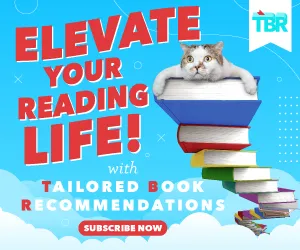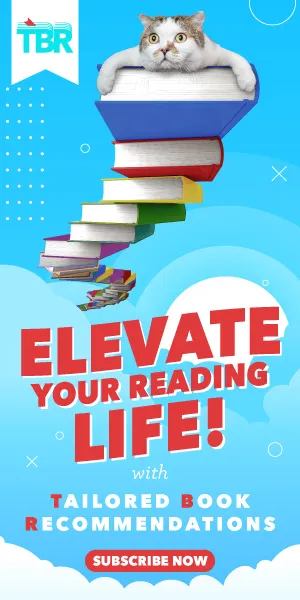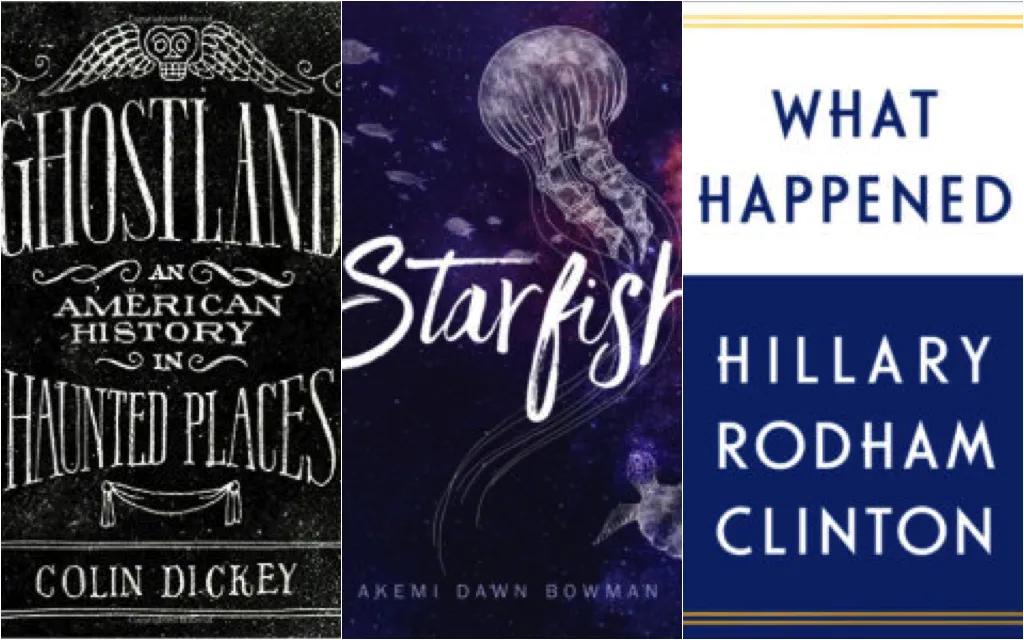
Riot Round-Up: The Best Books We Read in September
This content contains affiliate links. When you buy through these links, we may earn an affiliate commission.
We asked our contributors to share the best book they read last month. We’ve got fiction, nonfiction, YA, and much, much more—there are book recommendations for everyone here! Some are old, some are new, and some aren’t even out yet. Enjoy and tell us about the highlight of your reading month in the comments.
 After the Eclipse: A Mother’s Murder, a Daughter’s Search by Sarah Perry
This is another excellent (yet difficult) read, in the true crime memoir genre. Sarah Perry was twelve and in the next room when her mother was murdered. Rather than writing a true crime about the murderer or night of the tragedy (both of which are discussed), she tells the story of her mother Crystal’s life and the life she had after her mother’s murder—from being passed around homes to no one knowing if the unknown killer would come back for her. The last section of the book is Sarah as an adult getting the phone call that they’d solved the case, the trial, and her talking to Crystal’s family and friends to fill in all the gaps of things that she didn’t know as a child. While heartbreaking and sometimes a difficult, emotional read, it’s nice to get to know and remember Crystal as the woman she lived as rather than the night of tragedy. Also a worthwhile read for Perry’s look at how sexism, slut-shaming, and misogyny places women’s lives in danger.
—Jamie Canaves
After the Eclipse: A Mother’s Murder, a Daughter’s Search by Sarah Perry
This is another excellent (yet difficult) read, in the true crime memoir genre. Sarah Perry was twelve and in the next room when her mother was murdered. Rather than writing a true crime about the murderer or night of the tragedy (both of which are discussed), she tells the story of her mother Crystal’s life and the life she had after her mother’s murder—from being passed around homes to no one knowing if the unknown killer would come back for her. The last section of the book is Sarah as an adult getting the phone call that they’d solved the case, the trial, and her talking to Crystal’s family and friends to fill in all the gaps of things that she didn’t know as a child. While heartbreaking and sometimes a difficult, emotional read, it’s nice to get to know and remember Crystal as the woman she lived as rather than the night of tragedy. Also a worthwhile read for Perry’s look at how sexism, slut-shaming, and misogyny places women’s lives in danger.
—Jamie Canaves
 An American Sickness by Elisabeth Rosenthal
Rosenthal makes a detailed case showing how our healthcare system is corrupt from top to bottom, proving our society is greed driven. Most people assume healthcare is a boring, but Rosenthal makes it fascinating. And we all need to learn what’s in this book before we get a surprised $375,000 hospital bill for services not covered by our insurance.
—James Wallace Harris
An American Sickness by Elisabeth Rosenthal
Rosenthal makes a detailed case showing how our healthcare system is corrupt from top to bottom, proving our society is greed driven. Most people assume healthcare is a boring, but Rosenthal makes it fascinating. And we all need to learn what’s in this book before we get a surprised $375,000 hospital bill for services not covered by our insurance.
—James Wallace Harris
 Bad for Her by Christi Barth (Avon Impulse, Oct 3rd)
Almost immediately after picking up this book I fell hard for Rafe Maguire, the former Chicago mobster now in WITSEC. Mollie Vickers, small-town Oregon doctor fell hard for him, too. Their story was full of sweet everyday moments. You know: shared text messages, lunch with the local chamber of commerce, sexy times in a forest…usual stuff. All that usual, regular stuff, though, made for an incredibly fun contemporary romance that features a bad boy who has gone so, so good.
—Erin McCoy
Bad for Her by Christi Barth (Avon Impulse, Oct 3rd)
Almost immediately after picking up this book I fell hard for Rafe Maguire, the former Chicago mobster now in WITSEC. Mollie Vickers, small-town Oregon doctor fell hard for him, too. Their story was full of sweet everyday moments. You know: shared text messages, lunch with the local chamber of commerce, sexy times in a forest…usual stuff. All that usual, regular stuff, though, made for an incredibly fun contemporary romance that features a bad boy who has gone so, so good.
—Erin McCoy
 Beasts of Extraordinary Circumstance by Ruth Emmie Lang
I read this book on the first of September and it has stayed with me all month. The story is whimsical and gorgeous. The writing is just beautiful. And it made me smile the entire time. It tells the story of Weylyn Grey, told through the eyes of people who have encountered him throughout his entire life. After his parents die in a freak storm, Weylyn is brought up by a pack of wolves in Michigan. In the woods, he befriends Mary, the daughter of the local butcher. There his adventure really picks up as Weylyn moves across the United States and comes to term with his mysterious gifts. To all those wary of magical realism novels—give Beasts a chance. I don’t read a lot of MR and I loved this with a passion.
—Kate Krug
Beasts of Extraordinary Circumstance by Ruth Emmie Lang
I read this book on the first of September and it has stayed with me all month. The story is whimsical and gorgeous. The writing is just beautiful. And it made me smile the entire time. It tells the story of Weylyn Grey, told through the eyes of people who have encountered him throughout his entire life. After his parents die in a freak storm, Weylyn is brought up by a pack of wolves in Michigan. In the woods, he befriends Mary, the daughter of the local butcher. There his adventure really picks up as Weylyn moves across the United States and comes to term with his mysterious gifts. To all those wary of magical realism novels—give Beasts a chance. I don’t read a lot of MR and I loved this with a passion.
—Kate Krug
 Border: A Journey to the Edge of Europe by Kapka Kassabova
The “edge of Europe” of Kassabova’s title is the border connecting (dividing?) Bulgaria, Greece, and Turkey. Border explores the history of the area and how the people living there have fared over the centuries through such tumultuous events as the rise and fall of the Soviet Union and the current refugee crisis. Kassabova describes her childhood in the region and her recent travels through it, telling stories of the people she meets and the marvelous and terrifying landscapes she travels through. Her book is a fascinating look into what borders are and how they have shaped individual lives and how people have understood themselves and others.
—Rebecca Hussey
Border: A Journey to the Edge of Europe by Kapka Kassabova
The “edge of Europe” of Kassabova’s title is the border connecting (dividing?) Bulgaria, Greece, and Turkey. Border explores the history of the area and how the people living there have fared over the centuries through such tumultuous events as the rise and fall of the Soviet Union and the current refugee crisis. Kassabova describes her childhood in the region and her recent travels through it, telling stories of the people she meets and the marvelous and terrifying landscapes she travels through. Her book is a fascinating look into what borders are and how they have shaped individual lives and how people have understood themselves and others.
—Rebecca Hussey
 Commonwealth by Ann Patchett
Spanning five decades, we watch families merge when Bert Cousins and Beverly Keating get married and bond their six children—her two, his four—together over summer vacations in Virginia. The step siblings aren’t supervised often. A bad thing happens. As they grow up, they grow apart. Until Franny dates an author, tells him stories about those summers, and that one summer in particular, and her story gets published. The family secrets are out, and what remains of the family comes back together. This book is just gorgeous. When I think about it, I taste orange juice.
—Ashley Holstrom
Commonwealth by Ann Patchett
Spanning five decades, we watch families merge when Bert Cousins and Beverly Keating get married and bond their six children—her two, his four—together over summer vacations in Virginia. The step siblings aren’t supervised often. A bad thing happens. As they grow up, they grow apart. Until Franny dates an author, tells him stories about those summers, and that one summer in particular, and her story gets published. The family secrets are out, and what remains of the family comes back together. This book is just gorgeous. When I think about it, I taste orange juice.
—Ashley Holstrom
 A Conjuring of Light by V. E. Schwab
The final novel in Schwab’s Shades of Magic series released this year, and when I found a signed copy at Comic Con, I couldn’t resist. This series hooked me from the first pages with its richly developed magical world, complex characters, and modern feel. The final book in this series delivers a satisfying final adventure and conclusion.
—Emily Wenstrom
A Conjuring of Light by V. E. Schwab
The final novel in Schwab’s Shades of Magic series released this year, and when I found a signed copy at Comic Con, I couldn’t resist. This series hooked me from the first pages with its richly developed magical world, complex characters, and modern feel. The final book in this series delivers a satisfying final adventure and conclusion.
—Emily Wenstrom
 A Conspiracy in Belgravia by Sherry Thomas
My favorite thing about the two Charlotte Holmes books so far is the way Sherry Thomas takes a structure that could be predictable and does something unique with it. In her first book, A Study in Scarlet Women, she turns the familiar Sherlock Holmes formula on its head by introducing the challenges a single woman would face in the role of detective. In this excellent follow-up, Thomas takes a premise that seems ripe for soapy drama—Charlotte agrees to secretly help the wife of the man she wants but can’t have—and twists it by using the calm and analytical Charlotte to drive the story. That emotion is only occasionally able to infiltrate the logical detective’s thoughts and actions makes the character and the book all the more compelling.
—Trisha Brown
A Conspiracy in Belgravia by Sherry Thomas
My favorite thing about the two Charlotte Holmes books so far is the way Sherry Thomas takes a structure that could be predictable and does something unique with it. In her first book, A Study in Scarlet Women, she turns the familiar Sherlock Holmes formula on its head by introducing the challenges a single woman would face in the role of detective. In this excellent follow-up, Thomas takes a premise that seems ripe for soapy drama—Charlotte agrees to secretly help the wife of the man she wants but can’t have—and twists it by using the calm and analytical Charlotte to drive the story. That emotion is only occasionally able to infiltrate the logical detective’s thoughts and actions makes the character and the book all the more compelling.
—Trisha Brown
 Death’s End by Cixin Liu, translated by Ken Liu
This is the last book in Cixin Liu’s grand, indescribably ambitious trilogy, Remembrance of Earth’s Past. It has the largest scope I’ve ever come across in a science fiction novel, and the most intense ideas and concepts I’ve come across in any type of literature. This book was more of an experience for me to go through rather than a book.
—Mya Nunnally
Death’s End by Cixin Liu, translated by Ken Liu
This is the last book in Cixin Liu’s grand, indescribably ambitious trilogy, Remembrance of Earth’s Past. It has the largest scope I’ve ever come across in a science fiction novel, and the most intense ideas and concepts I’ve come across in any type of literature. This book was more of an experience for me to go through rather than a book.
—Mya Nunnally
 A Different Pond by Bao Phi, illustrated by Thi Bui
This is a picture book about a refugee family from Vietnam who makes a home in the United States. The story begins with a father waking up his son early in the morning so they can go fishing to catch food for dinner. Through dialogue, it becomes known that the father works two jobs, the mother works, and the son takes care of his younger sibling during the day. Gorgeously written with beautiful illustrations, I think that everyone—no matter their age—should read this picture book.
—Karina Glaser
A Different Pond by Bao Phi, illustrated by Thi Bui
This is a picture book about a refugee family from Vietnam who makes a home in the United States. The story begins with a father waking up his son early in the morning so they can go fishing to catch food for dinner. Through dialogue, it becomes known that the father works two jobs, the mother works, and the son takes care of his younger sibling during the day. Gorgeously written with beautiful illustrations, I think that everyone—no matter their age—should read this picture book.
—Karina Glaser
 The Duchess Deal by Tessa Dare
This was the last book I read in September, and it was just the time to read something heartwarming and hilarious. A take on Beauty and the Beast, it features a seamstress down on her luck and a misanthropic duke with half a body covered in scars thanks to an artillery mishap. The pair enter a marriage of convenience, no love allowed, but they have some serious chemistry that fights them every step of the way. Complete with Tessa Dare’s usual wit and charm, incredibly clever Shakespearean insults, not to mention a few—okay, one—of my favorite new side characters in historical romance, this book was a perfect way to wrap up September.
—Jessica Pryde
The Duchess Deal by Tessa Dare
This was the last book I read in September, and it was just the time to read something heartwarming and hilarious. A take on Beauty and the Beast, it features a seamstress down on her luck and a misanthropic duke with half a body covered in scars thanks to an artillery mishap. The pair enter a marriage of convenience, no love allowed, but they have some serious chemistry that fights them every step of the way. Complete with Tessa Dare’s usual wit and charm, incredibly clever Shakespearean insults, not to mention a few—okay, one—of my favorite new side characters in historical romance, this book was a perfect way to wrap up September.
—Jessica Pryde
 Electric Arches by Eve L. Ewing
This hybrid collection of poetry, prose, and art is chock-full of youthful wonder and sharp cultural critique. Ewing examines Chicago’s segregation, racial injustice, police brutality, and black girlhood in vignettes that veer from stark realism to the fantastical. However, what makes this collection a true standout is its accessibility. Electric Arches feels designed to be meaningful for young students and adults in equal measure. The poems don’t obfuscate; instead, they provide meaning upfront and challenge the reader to think about the larger meaning. The book is beautiful as both a physical object and cultural artifact. It’s not to be missed.
—Aram Mrjoian
Electric Arches by Eve L. Ewing
This hybrid collection of poetry, prose, and art is chock-full of youthful wonder and sharp cultural critique. Ewing examines Chicago’s segregation, racial injustice, police brutality, and black girlhood in vignettes that veer from stark realism to the fantastical. However, what makes this collection a true standout is its accessibility. Electric Arches feels designed to be meaningful for young students and adults in equal measure. The poems don’t obfuscate; instead, they provide meaning upfront and challenge the reader to think about the larger meaning. The book is beautiful as both a physical object and cultural artifact. It’s not to be missed.
—Aram Mrjoian
 Exit West by Mohsin Hamid
When I sat down to read the first few pages of Exit West, I was floored. I couldn’t finish How to Get Filthy Rich in Rising Asia, so I’m glad I gave Mohsin Hamid another chance: Exit West might be the best book I’ve read all year. The writing took my breath away! It was so validating reading someone else who writes in these big, broken up sentences that could be accused of rambling if not for the sheer beauty and magic spilling everywhere. But where my sentences feel clunky, like I’m falling down stairs, and there’s coffee spilling all over the place and phrases flyin’ like they’ll fall outta my bags, Hamid’s prose feels like you have six different magic spells going on at the same time, each coloring a scene so crazy vivid that you don’t realize you’ve been holding your breath until you find the end of the sentence and each layer astounds. The story itself is just as haunting as the prose. Saeed and Nadia are young adults, living in an increasingly war-torn country in the Middle East. As everyday life crumbles around them and their fledgling love story becomes understandably more difficult to navigate, Nadia (a striking, complex feminist; I love her) and Saeed adventure after mysterious doors that are rumored to open to other parts of the world, away from the fighting. That’s when the story gets flipped, turned upside down. If the first half flowers in the wonder and magic of familial ties and responsibility, the romanticism of ideals, and the intimacy of new love, then the second half offers a more tempered realism that (gently, so gently) saves the story from collapsing becoming too saccharine. Exit West is a story that questions the possibility of escape, the elasticity of identity, and the terrifying power of transformation.
—Katie Hardy
Exit West by Mohsin Hamid
When I sat down to read the first few pages of Exit West, I was floored. I couldn’t finish How to Get Filthy Rich in Rising Asia, so I’m glad I gave Mohsin Hamid another chance: Exit West might be the best book I’ve read all year. The writing took my breath away! It was so validating reading someone else who writes in these big, broken up sentences that could be accused of rambling if not for the sheer beauty and magic spilling everywhere. But where my sentences feel clunky, like I’m falling down stairs, and there’s coffee spilling all over the place and phrases flyin’ like they’ll fall outta my bags, Hamid’s prose feels like you have six different magic spells going on at the same time, each coloring a scene so crazy vivid that you don’t realize you’ve been holding your breath until you find the end of the sentence and each layer astounds. The story itself is just as haunting as the prose. Saeed and Nadia are young adults, living in an increasingly war-torn country in the Middle East. As everyday life crumbles around them and their fledgling love story becomes understandably more difficult to navigate, Nadia (a striking, complex feminist; I love her) and Saeed adventure after mysterious doors that are rumored to open to other parts of the world, away from the fighting. That’s when the story gets flipped, turned upside down. If the first half flowers in the wonder and magic of familial ties and responsibility, the romanticism of ideals, and the intimacy of new love, then the second half offers a more tempered realism that (gently, so gently) saves the story from collapsing becoming too saccharine. Exit West is a story that questions the possibility of escape, the elasticity of identity, and the terrifying power of transformation.
—Katie Hardy
 The Forgotten Beasts of Eld by Patricia McKillip
Badass lady wizard alert! I’ve come to McKillip only recently, and I’m cherishing the experience. Her prose is like poetry; her plots subtle; her characters heartbreaking. When I first began reading Eld, I thought I recognized the story. A young boy comes to live with his wizard aunt to hide from his father the king. Oh, and wizard aunt has a dragon, a riddling boar, a giant falcon. But the plot took an unexpected turn. As the story progressed, I realised McKillip had something far more poignant and beautiful in mind. And it really is a beautiful novel. I cannot recommend it highly enough for fantasy fans. If you haven’t read her before, come join me in cherishing her novels bit by bit. And if you have read her before, I bet Eld is one you reread often.
—Margaret Kingsbury
The Forgotten Beasts of Eld by Patricia McKillip
Badass lady wizard alert! I’ve come to McKillip only recently, and I’m cherishing the experience. Her prose is like poetry; her plots subtle; her characters heartbreaking. When I first began reading Eld, I thought I recognized the story. A young boy comes to live with his wizard aunt to hide from his father the king. Oh, and wizard aunt has a dragon, a riddling boar, a giant falcon. But the plot took an unexpected turn. As the story progressed, I realised McKillip had something far more poignant and beautiful in mind. And it really is a beautiful novel. I cannot recommend it highly enough for fantasy fans. If you haven’t read her before, come join me in cherishing her novels bit by bit. And if you have read her before, I bet Eld is one you reread often.
—Margaret Kingsbury
 George by Alex Gino
I’d heard great things about this book from when it was first published, but since I don’t usually read children’s fiction as an adult, it took me awhile to get around to this one. Oh. My. Goodness. If you haven’t read this book yet, you are missing out! The main character’s name is George, but George hates living like a boy and being treated like a boy. When she learns that her class is going to be putting on Charlotte’s Web as a school play, she and her best friend Kelly devise a plan so that George can play the part of Charlotte (a role typically reserved for a girl) and show everyone who she truly is inside. Not surprisingly, this book has been on ALA’s Top 10 List of Banned/Challenged Books since it was first published because of its straightforward discussion of transgender issues, but this is a wonderfully empathetic story about a child coming to terms with their identity, and learning how to accept who she is. It’s funny and sweet and sad and joyous and by the time I finished the book I wanted to give it to everyone I knew—adults AND children. Seriously, do yourself a favor and read this book. It’s an absolute delight.
—Katie McLain
George by Alex Gino
I’d heard great things about this book from when it was first published, but since I don’t usually read children’s fiction as an adult, it took me awhile to get around to this one. Oh. My. Goodness. If you haven’t read this book yet, you are missing out! The main character’s name is George, but George hates living like a boy and being treated like a boy. When she learns that her class is going to be putting on Charlotte’s Web as a school play, she and her best friend Kelly devise a plan so that George can play the part of Charlotte (a role typically reserved for a girl) and show everyone who she truly is inside. Not surprisingly, this book has been on ALA’s Top 10 List of Banned/Challenged Books since it was first published because of its straightforward discussion of transgender issues, but this is a wonderfully empathetic story about a child coming to terms with their identity, and learning how to accept who she is. It’s funny and sweet and sad and joyous and by the time I finished the book I wanted to give it to everyone I knew—adults AND children. Seriously, do yourself a favor and read this book. It’s an absolute delight.
—Katie McLain
 Ghostland by Colin Dickey
I expected Ghostland: An American History in Haunted Places to be a fun, spooky fall read. And it is, but it’s so much more than that. Dickey gives readers a whirlwind tour of some of America’s most famous haunted houses, hotels, brothels, bars, asylums, and graveyards. But it’s not the alleged hauntings themselves that drive the narrative. Rather, it is what these ghost stories say about our cultural anxieties, fears, and obsessions that Dickey seeks to uncover. In the process, he takes readers back in time to the madness of the Salem Witch Trials, the horror of southern slave plantations, and the parlors where the women of the 19th century spiritualist movement found power before suffrage. If you enjoy solid history flavored with a hint of mystery and the paranormal, you will love this book!
—Kate Scott
Ghostland by Colin Dickey
I expected Ghostland: An American History in Haunted Places to be a fun, spooky fall read. And it is, but it’s so much more than that. Dickey gives readers a whirlwind tour of some of America’s most famous haunted houses, hotels, brothels, bars, asylums, and graveyards. But it’s not the alleged hauntings themselves that drive the narrative. Rather, it is what these ghost stories say about our cultural anxieties, fears, and obsessions that Dickey seeks to uncover. In the process, he takes readers back in time to the madness of the Salem Witch Trials, the horror of southern slave plantations, and the parlors where the women of the 19th century spiritualist movement found power before suffrage. If you enjoy solid history flavored with a hint of mystery and the paranormal, you will love this book!
—Kate Scott
 Home Fire by Kamila Shamsie
When I saw this book on the Booker longlist I finally got myself into gear and decided I needed to read it right now. It was a good decision. Writing about terrorism, its impact on Muslim communities, and other complex issues of race, religion, and immigration can either feel detached from reality or reek of an after-school special. But Shamsie’s story and characters feel like real people you know, while the big stories that impact these characters’ lives also feel like ripped-from-the-headlines stories you recognize. This is a book that’s big on plot but also relishes small moments and the inner lives of its characters with a multiple point-of-view structure. It’s one of my favorite books this year.
—Jessica Woodbury
Home Fire by Kamila Shamsie
When I saw this book on the Booker longlist I finally got myself into gear and decided I needed to read it right now. It was a good decision. Writing about terrorism, its impact on Muslim communities, and other complex issues of race, religion, and immigration can either feel detached from reality or reek of an after-school special. But Shamsie’s story and characters feel like real people you know, while the big stories that impact these characters’ lives also feel like ripped-from-the-headlines stories you recognize. This is a book that’s big on plot but also relishes small moments and the inner lives of its characters with a multiple point-of-view structure. It’s one of my favorite books this year.
—Jessica Woodbury
 Hide by Matthew Griffin
This book was physically painful to read, in the best possible way. I found myself often having to put it down for a moment to take a breath and ease the aching in my chest. It’s the story of a gay couple in their 80s, who fell in love just after WWII in rural North Carolina. In order to share a life together, they chose to cut themselves off from the world. When Frank has a stroke and Wendell is left to care for him, they’re forced to confront what they’ve given up for each other. It’s a complicated, nuanced, and searingly honest portrait of a marriage. It’s also one of the most intimate and gorgeously written portrayals of old age and illness that I have ever read. There were several scenes so perfectly rendered and heartbreakingly detailed that they left me with shivers.
—Laura Sackton
Hide by Matthew Griffin
This book was physically painful to read, in the best possible way. I found myself often having to put it down for a moment to take a breath and ease the aching in my chest. It’s the story of a gay couple in their 80s, who fell in love just after WWII in rural North Carolina. In order to share a life together, they chose to cut themselves off from the world. When Frank has a stroke and Wendell is left to care for him, they’re forced to confront what they’ve given up for each other. It’s a complicated, nuanced, and searingly honest portrait of a marriage. It’s also one of the most intimate and gorgeously written portrayals of old age and illness that I have ever read. There were several scenes so perfectly rendered and heartbreakingly detailed that they left me with shivers.
—Laura Sackton
 Hidden Figures: The American Dream and the Untold Story of the Black Women Mathematicians Who Helped Win the Space Race by Margot Lee Shetterly
In education and pop culture about American history, African-Americans are often limited to two contexts—slavery and civil rights. When it comes to other periods and events in history—space, wars (other than the Civil War), whatever—it as if non-white people and women of any hue largely didn’t exist. To the extent the existence of women and minorities is acknowledged, they are often confined to a supporting role like maid, wife, or secretary. While supporting roles are extremely important, they are not the only way women and minorities have contributed to American history. In Hidden Figures Ms. Shetterly proves that by exploring the work of African-American women at NASA and its predecessor, work that helped make it possible for America to explore space. It is an amazing true story, one more people should know about. If you saw the movie, great, but the book is even better.
—Tiffani Willis
Hidden Figures: The American Dream and the Untold Story of the Black Women Mathematicians Who Helped Win the Space Race by Margot Lee Shetterly
In education and pop culture about American history, African-Americans are often limited to two contexts—slavery and civil rights. When it comes to other periods and events in history—space, wars (other than the Civil War), whatever—it as if non-white people and women of any hue largely didn’t exist. To the extent the existence of women and minorities is acknowledged, they are often confined to a supporting role like maid, wife, or secretary. While supporting roles are extremely important, they are not the only way women and minorities have contributed to American history. In Hidden Figures Ms. Shetterly proves that by exploring the work of African-American women at NASA and its predecessor, work that helped make it possible for America to explore space. It is an amazing true story, one more people should know about. If you saw the movie, great, but the book is even better.
—Tiffani Willis
 The Hate U Give by Angie Thomas
This is a book everyone should read to understand better the pressure, oppression, and social inequality black people in general, and specifically in America, have to deal with since birth. It’s a fictitious story with a lot of truth to it, and if you don’t feel anger when you are reading it, anger for this messed up society which privileges the white and the rich, then you are part of the problem. It made me fear for the characters’ lives and it also made me realise I probably couldn’t live with the sort of fear the main characters have to live every single day. A powerful story that we should all pass on to others.
—Carina Pereira
The Hate U Give by Angie Thomas
This is a book everyone should read to understand better the pressure, oppression, and social inequality black people in general, and specifically in America, have to deal with since birth. It’s a fictitious story with a lot of truth to it, and if you don’t feel anger when you are reading it, anger for this messed up society which privileges the white and the rich, then you are part of the problem. It made me fear for the characters’ lives and it also made me realise I probably couldn’t live with the sort of fear the main characters have to live every single day. A powerful story that we should all pass on to others.
—Carina Pereira
 Insignificant Events in the Life of a Cactus by Dusti Bowling
I feel like I have a really good track record when it comes to reading amazing intermediate books. I don’t read nearly as many of them as I would like, but when I do pick one up, it’s always fantastic. Case in point: this wonderful and often funny story about Aven, a thirteen-year-old girl with no arms. Aven doesn’t need anyone’s pity: she can do anything anyone else can do, she just does it with her feet instead. She has grown up in Kansas her whole life, going to school with the same kids. They know her and how she likes to make jokes about losing her arms to ninjas and coyotes. But when Aven learns her family is moving to Arizona for her dad’s new job, she stresses about all the strangers she will encounter who will stare and ask questions and make fun of her. Luckily she makes a friend right away: Connor, a boy with Tourette Syndrome, who feels as much an outsider as she does. Together they explore Stagecoach Pass, the western-themed amusement park her father now manages, try and solve a murder mystery, and learn to face their doubts and fears together. So many heart eye emojis for this one.
—Liberty Hardy
Insignificant Events in the Life of a Cactus by Dusti Bowling
I feel like I have a really good track record when it comes to reading amazing intermediate books. I don’t read nearly as many of them as I would like, but when I do pick one up, it’s always fantastic. Case in point: this wonderful and often funny story about Aven, a thirteen-year-old girl with no arms. Aven doesn’t need anyone’s pity: she can do anything anyone else can do, she just does it with her feet instead. She has grown up in Kansas her whole life, going to school with the same kids. They know her and how she likes to make jokes about losing her arms to ninjas and coyotes. But when Aven learns her family is moving to Arizona for her dad’s new job, she stresses about all the strangers she will encounter who will stare and ask questions and make fun of her. Luckily she makes a friend right away: Connor, a boy with Tourette Syndrome, who feels as much an outsider as she does. Together they explore Stagecoach Pass, the western-themed amusement park her father now manages, try and solve a murder mystery, and learn to face their doubts and fears together. So many heart eye emojis for this one.
—Liberty Hardy
 A Kiss in Lavender (Le Vie en Roses #4) by Laura Florand
Probably the best book of this entire series, A Kiss in Lavender follows the homecoming of the mysterious and long-absent Lucien Rosier, who ran away from home at nineteen to join the Foreign Legion. After fifteen years, his Tante Colette asks Elena Lyon to track him down. Some parts of this book were a little difficult to buy into because Elena seemed like a legit crazy person (I would have appreciated one or two scenes with that therapist she was always promising she was going to start seeing, just to know the issues were indeed being worked on). I found myself thinking Lucien must have the patience of a saint. But at the same time, it’s a truly heartwarming book about coming back home and not so much recognizing your place in the world as making decisions about where and who you want to be. I think the romance arc is also the most emotionally satisfying of the whole series. If you’re a Florand fan, you’ll want to read this asap.
–Tasha Brandstatter
A Kiss in Lavender (Le Vie en Roses #4) by Laura Florand
Probably the best book of this entire series, A Kiss in Lavender follows the homecoming of the mysterious and long-absent Lucien Rosier, who ran away from home at nineteen to join the Foreign Legion. After fifteen years, his Tante Colette asks Elena Lyon to track him down. Some parts of this book were a little difficult to buy into because Elena seemed like a legit crazy person (I would have appreciated one or two scenes with that therapist she was always promising she was going to start seeing, just to know the issues were indeed being worked on). I found myself thinking Lucien must have the patience of a saint. But at the same time, it’s a truly heartwarming book about coming back home and not so much recognizing your place in the world as making decisions about where and who you want to be. I think the romance arc is also the most emotionally satisfying of the whole series. If you’re a Florand fan, you’ll want to read this asap.
–Tasha Brandstatter
 The Letters of Sylvia Plath, Volume 1 by Sylvia Plath
Clocking in at more than 1000 pages, this is not an easy read, but as someone who loves all things Sivvy, I have loved reading these letters. There’s something so intimate about reading someone’s letters, and I’ve enjoyed “getting to know” Plath better. (Forthcoming October 17.)
—Jaime Herndon
The Letters of Sylvia Plath, Volume 1 by Sylvia Plath
Clocking in at more than 1000 pages, this is not an easy read, but as someone who loves all things Sivvy, I have loved reading these letters. There’s something so intimate about reading someone’s letters, and I’ve enjoyed “getting to know” Plath better. (Forthcoming October 17.)
—Jaime Herndon
 Lincoln in the Bardo by George Saunders
Who’d a thunk that Buddhism and Abraham Lincoln would go together like chocolate and peanut butter? It’s such an odd experience, with 100+ narrators (some real and some fictional and some who are ghosts), talking about Lincoln’s son Willie going through purgatory. But it’s also a great portrait of Lincoln on an awful day, and a really touching tribute to grief and moving on. It’s Spoon River Anthology on caffeine.
Plus, the audiobook is WILD. Hope you like lots of narrators, ’cause there are 166 voice actors on this one!
—Zachary Littrell
Lincoln in the Bardo by George Saunders
Who’d a thunk that Buddhism and Abraham Lincoln would go together like chocolate and peanut butter? It’s such an odd experience, with 100+ narrators (some real and some fictional and some who are ghosts), talking about Lincoln’s son Willie going through purgatory. But it’s also a great portrait of Lincoln on an awful day, and a really touching tribute to grief and moving on. It’s Spoon River Anthology on caffeine.
Plus, the audiobook is WILD. Hope you like lots of narrators, ’cause there are 166 voice actors on this one!
—Zachary Littrell
 Long Way Down by Jason Reynolds
I’ve read and enjoyed each of Reynolds’s YA books, but this one takes the spot as my favorite. This fast-paced verse novel is about a boy itching to take revenge on the person who killed his older brother. It takes place over the course of seconds in an elevator; along each stop, Will meets someone he knows whose life has been impacted by violence.
But it’s the last page, that last line, that makes this book go from compelling to out-of-this-world powerful. Rarely do books give me chills, but this one did, and I can’t wait to press it into the hands of every reader possible. Reynolds is at the top of his game and I can’t wait to see what he writes next.
—Kelly Jensen
Long Way Down by Jason Reynolds
I’ve read and enjoyed each of Reynolds’s YA books, but this one takes the spot as my favorite. This fast-paced verse novel is about a boy itching to take revenge on the person who killed his older brother. It takes place over the course of seconds in an elevator; along each stop, Will meets someone he knows whose life has been impacted by violence.
But it’s the last page, that last line, that makes this book go from compelling to out-of-this-world powerful. Rarely do books give me chills, but this one did, and I can’t wait to press it into the hands of every reader possible. Reynolds is at the top of his game and I can’t wait to see what he writes next.
—Kelly Jensen
 Looking for Enid by Duncan Mclaren.
This is possible one of the strangest books about an author and possibly also one of the best that I’ve ever read. Enid Blyton is a landmark figure in children’s literature and McLaren’s idiosyncratic, distinct, and eccentric investigation of her is an oddly fitting tribute. McLaren roams briskly through discussion of Blyton’s life, interspersing it with what can only be deemed as fanfic, and perhaps a little bit too much detail about his own sex life. This isn’t your normal biography by any means, but it’s kind of unputdownable.
—Daisy Johnson
Looking for Enid by Duncan Mclaren.
This is possible one of the strangest books about an author and possibly also one of the best that I’ve ever read. Enid Blyton is a landmark figure in children’s literature and McLaren’s idiosyncratic, distinct, and eccentric investigation of her is an oddly fitting tribute. McLaren roams briskly through discussion of Blyton’s life, interspersing it with what can only be deemed as fanfic, and perhaps a little bit too much detail about his own sex life. This isn’t your normal biography by any means, but it’s kind of unputdownable.
—Daisy Johnson
 Love, Hate, and Other Filters by Samira Ahmed
Love, Hate, and Other Filters was honestly a highly anticipated read for me since it deals with the difficult topic of terrorism and Islamophobia. It didn’t disappoint. Maya is a really interesting, well developed protagonist who I could totally relate to. And the story of facing increased Islamophobia after a terror attack hit almost a little too close to home.
—Adiba Jaigirdar
Love, Hate, and Other Filters by Samira Ahmed
Love, Hate, and Other Filters was honestly a highly anticipated read for me since it deals with the difficult topic of terrorism and Islamophobia. It didn’t disappoint. Maya is a really interesting, well developed protagonist who I could totally relate to. And the story of facing increased Islamophobia after a terror attack hit almost a little too close to home.
—Adiba Jaigirdar
 Little Fires Everywhere by Celeste Ng
I was a little skeptical at first about this book because it was super tough for me personally to get through Celeste Ng’s first novel. What I found was a story so full of depth and themes to make your head spin. It’s set in Shaker Heights, Ohio, which on the outside seems like a quaint little town until Mia and her daughter Pearl arrive and bring an outsider’s perspective to the story. But what it unpacks is so diverse. It’s about coming-of-age. It’s about getting older and remembering the person you were. It’s about the love of a mother. It’s about placement in the world and art and struggling to find truth in yourself and sacrifices and the truth in others. There was so much going on in this book that I was honestly surprised that it was only 300+ pages long.
—Simone Jung
Little Fires Everywhere by Celeste Ng
I was a little skeptical at first about this book because it was super tough for me personally to get through Celeste Ng’s first novel. What I found was a story so full of depth and themes to make your head spin. It’s set in Shaker Heights, Ohio, which on the outside seems like a quaint little town until Mia and her daughter Pearl arrive and bring an outsider’s perspective to the story. But what it unpacks is so diverse. It’s about coming-of-age. It’s about getting older and remembering the person you were. It’s about the love of a mother. It’s about placement in the world and art and struggling to find truth in yourself and sacrifices and the truth in others. There was so much going on in this book that I was honestly surprised that it was only 300+ pages long.
—Simone Jung
 The Many Lives of Catwoman: The Felonious History of a Feline Fatale by Tim Hanley
I don’t read a ton of non-fiction and I have to be pretty impressed with any book to tolerate the sustained interruption of a Star Wars binge. The Many Lives of Catwoman was a phenomenal read which follows not only Selina Kyle’s career in comics but also explores the social and historical contexts for each of her various iterations. A great read for anyone interested in the character of Catwoman and for anyone who thinks comics are just colorful pictures devoid of deeper meaning (spoiler: they’re far, far more).
—S.W. Sondheimer
The Many Lives of Catwoman: The Felonious History of a Feline Fatale by Tim Hanley
I don’t read a ton of non-fiction and I have to be pretty impressed with any book to tolerate the sustained interruption of a Star Wars binge. The Many Lives of Catwoman was a phenomenal read which follows not only Selina Kyle’s career in comics but also explores the social and historical contexts for each of her various iterations. A great read for anyone interested in the character of Catwoman and for anyone who thinks comics are just colorful pictures devoid of deeper meaning (spoiler: they’re far, far more).
—S.W. Sondheimer
 My Absolute Darling by Gabriel Tallent
The tale of teenage Turtle Alveston and her quest for safety and survival from an abusive father. Turtle is wild and spends her days deep in the redwoods of the Californian Coast, isolated and lost to the world, her only version of normality is her manipulative and sadistic father. A chance encounter with two precocious teenagers shines light in the cracks of Turtle’s version of reality, allowing her to see a way out. It’s Lolita meets Winter’s Bone and every bit horrible and haunting: read with caution.
—Laura Oosterbeek
My Absolute Darling by Gabriel Tallent
The tale of teenage Turtle Alveston and her quest for safety and survival from an abusive father. Turtle is wild and spends her days deep in the redwoods of the Californian Coast, isolated and lost to the world, her only version of normality is her manipulative and sadistic father. A chance encounter with two precocious teenagers shines light in the cracks of Turtle’s version of reality, allowing her to see a way out. It’s Lolita meets Winter’s Bone and every bit horrible and haunting: read with caution.
—Laura Oosterbeek
 The Nordic Theory of Everything by Anu Partenen (Harper)
Written by a Finnish journalist who immigrated to America, this book examines the differences between the Nordic and American way of life in various arenas: family living, work/life balance, attitudes, healthcare. Partenen doesn’t present the Nordic way as a panacea that will fix everything that’s wrong with America, and nor does she ignore the positive aspects of American culture and life. Each chapter offers a critique of the American method as well as a potential solution.
I moved to America last year for the essentially the same reason as Partenen (we both moved here for love), and although my home country of Australia is not as progressive as Finland and other Nordic countries, there were (and are) many things about America that make me think, “How do you guys think that this okay? Really?” This book eloquently conveys many of the thoughts and feelings I have about the US. If you care about living a healthy, happy, independent, empowered life where you are truly free (and not the American notion of free which doesn’t really seem free at all), you should read this book.
—Jen Sherman
The Nordic Theory of Everything by Anu Partenen (Harper)
Written by a Finnish journalist who immigrated to America, this book examines the differences between the Nordic and American way of life in various arenas: family living, work/life balance, attitudes, healthcare. Partenen doesn’t present the Nordic way as a panacea that will fix everything that’s wrong with America, and nor does she ignore the positive aspects of American culture and life. Each chapter offers a critique of the American method as well as a potential solution.
I moved to America last year for the essentially the same reason as Partenen (we both moved here for love), and although my home country of Australia is not as progressive as Finland and other Nordic countries, there were (and are) many things about America that make me think, “How do you guys think that this okay? Really?” This book eloquently conveys many of the thoughts and feelings I have about the US. If you care about living a healthy, happy, independent, empowered life where you are truly free (and not the American notion of free which doesn’t really seem free at all), you should read this book.
—Jen Sherman
 The Princess Saves Herself in this One by Amanda Lovelace
The title drew me to this book, but within a few pages it had become my new favorite book of poetry. Don’t get me wrong, I like poems. But I usually approach collections with the idea that I will read a few a day and take lots of breaks and only one or two will really stand out to me. But this book felt like a punch to the stomach…in a good way. Once I started reading, I couldn’t put it down. The sections the princess, the damsel, and the queen weave allegory and archetype together with reality to show three periods in the author’s life. The final section of the book gives the reader powerful encouragement and advice for living. These poems feel simple, powerful, and, perhaps more importantly, empowering. I’m very excited for the forthcoming sequel The Witch Doesn’t Burn in this One.
—Alison Doherty
The Princess Saves Herself in this One by Amanda Lovelace
The title drew me to this book, but within a few pages it had become my new favorite book of poetry. Don’t get me wrong, I like poems. But I usually approach collections with the idea that I will read a few a day and take lots of breaks and only one or two will really stand out to me. But this book felt like a punch to the stomach…in a good way. Once I started reading, I couldn’t put it down. The sections the princess, the damsel, and the queen weave allegory and archetype together with reality to show three periods in the author’s life. The final section of the book gives the reader powerful encouragement and advice for living. These poems feel simple, powerful, and, perhaps more importantly, empowering. I’m very excited for the forthcoming sequel The Witch Doesn’t Burn in this One.
—Alison Doherty
 Real Artists Don’t Starve by Jeff Goins
Creating can be a lonely business. So can paying the bills. There is also the myth of the starving artist; that people can’t pay their bills doing what they love. Jeff Goins believes that someone who wants to create, to act, to perform, doesn’t have to accept that myth. He goes back to Michelangelo to dispel that myth, to say that we artists must fight for ourselves because we deserve more than creating for nothing. Inspiring, practical and motivational, Goins knows how to lift up his audience.
—Priya Sridhar
Real Artists Don’t Starve by Jeff Goins
Creating can be a lonely business. So can paying the bills. There is also the myth of the starving artist; that people can’t pay their bills doing what they love. Jeff Goins believes that someone who wants to create, to act, to perform, doesn’t have to accept that myth. He goes back to Michelangelo to dispel that myth, to say that we artists must fight for ourselves because we deserve more than creating for nothing. Inspiring, practical and motivational, Goins knows how to lift up his audience.
—Priya Sridhar
 Rebel Seoul by Axie Oh
Do you want a bit of forbidden romance and government rebellion, all with a side of mech robots? The book has been described as Pacific Rim meets Korean action dramas and it absolutely delivers. Oh’s debut YA novel is set in a futuristic South Korea, where people are split between Old Seoul, ruled by gangs and poverty, and Neo Seoul, a stunningly-advanced world where a never-ending war rules the lives and careers of those who live there. Jaewon is our hero who helps us explore these two worlds—Old Seoul where he was abandoned as a child and had to fight to live on the streets, and Neo Seoul where those same abilities have made him one of the best combat pilots in his academy.
Rebel Seoul is an action-packed ride that somehow manages to slow down at the best times to show us the humanity of the people living in this world. All with some damn cool robots.
—Nikki VanRy
Rebel Seoul by Axie Oh
Do you want a bit of forbidden romance and government rebellion, all with a side of mech robots? The book has been described as Pacific Rim meets Korean action dramas and it absolutely delivers. Oh’s debut YA novel is set in a futuristic South Korea, where people are split between Old Seoul, ruled by gangs and poverty, and Neo Seoul, a stunningly-advanced world where a never-ending war rules the lives and careers of those who live there. Jaewon is our hero who helps us explore these two worlds—Old Seoul where he was abandoned as a child and had to fight to live on the streets, and Neo Seoul where those same abilities have made him one of the best combat pilots in his academy.
Rebel Seoul is an action-packed ride that somehow manages to slow down at the best times to show us the humanity of the people living in this world. All with some damn cool robots.
—Nikki VanRy
 The Sacred Lies of Minnow Bly by Stephanie Oakes
I was really in the mood to read something dark, and when I picked up Oakes’ debut and read the back…a story about a teen girl who escaped a cult that cut off her hands…well, I knew I found the book I was searching for. It’s a YA novel that tells a story that’s horrifying, with prose that is beautiful and poetic, shifting from Minnow’s time in the cult to her present state in juvenile detention. As her mystery unravels thanks to an FBI agent that refuses to give up on her, you learn about the cult, her first love, and everything that led up to her hands being cut off. It’s sure to haunt you long after you’ve finished reading, and I’m all kinds of excited to start her latest novel, The Arsonist.
—Eric Smith
The Sacred Lies of Minnow Bly by Stephanie Oakes
I was really in the mood to read something dark, and when I picked up Oakes’ debut and read the back…a story about a teen girl who escaped a cult that cut off her hands…well, I knew I found the book I was searching for. It’s a YA novel that tells a story that’s horrifying, with prose that is beautiful and poetic, shifting from Minnow’s time in the cult to her present state in juvenile detention. As her mystery unravels thanks to an FBI agent that refuses to give up on her, you learn about the cult, her first love, and everything that led up to her hands being cut off. It’s sure to haunt you long after you’ve finished reading, and I’m all kinds of excited to start her latest novel, The Arsonist.
—Eric Smith
 She Regrets Nothing By Andrea Dunlop
Scandal, social climbing and sad rich people—my personal catnip. This is very much a tale of modern, monied New York, but governed by the social rules of old. Our hero Laila Lawrence manages to walk a fine line between mercenary and sympathetic, and every character is a delight to follow.
—Rachel Weber
She Regrets Nothing By Andrea Dunlop
Scandal, social climbing and sad rich people—my personal catnip. This is very much a tale of modern, monied New York, but governed by the social rules of old. Our hero Laila Lawrence manages to walk a fine line between mercenary and sympathetic, and every character is a delight to follow.
—Rachel Weber
 Sing, Unburied, Sing by Jesmyn Ward
This book has been getting a lot of critical attention and it is for good reason. Jesmyn Ward is a masterful writer. She creates atmospheric books and pulls readers into the world of her characters. Focusing on a Southern, rural, poor black family, Ward creates incredibly complicated characters who will break your heart.
—Rincey Abraham
Sing, Unburied, Sing by Jesmyn Ward
This book has been getting a lot of critical attention and it is for good reason. Jesmyn Ward is a masterful writer. She creates atmospheric books and pulls readers into the world of her characters. Focusing on a Southern, rural, poor black family, Ward creates incredibly complicated characters who will break your heart.
—Rincey Abraham
 Spellbook for the Lost & Found by Moira Fowley-Doyle
I adored Fowley-Doyle’s debut novel, The Accident Season, and her sophomore release did not disappoint. Two best friends suffer the consequences of a spell to reclaim lost things and find themselves drawn into a magical mystery that has haunted their Irish town for years. This story has some sneaky queer girl rep that the summary doesn’t indicate, and I was downright delighted, and the romantic storylines were beautiful. The characters are all compelling and you’ll race through this book just to see how their paths intersect.
—Tirzah Price
Spellbook for the Lost & Found by Moira Fowley-Doyle
I adored Fowley-Doyle’s debut novel, The Accident Season, and her sophomore release did not disappoint. Two best friends suffer the consequences of a spell to reclaim lost things and find themselves drawn into a magical mystery that has haunted their Irish town for years. This story has some sneaky queer girl rep that the summary doesn’t indicate, and I was downright delighted, and the romantic storylines were beautiful. The characters are all compelling and you’ll race through this book just to see how their paths intersect.
—Tirzah Price
 Spinning by Tillie Walden
Tillie Walden’s Spinning is a starkly beautiful memoir about a girl who is stuck in place: between youth and adulthood, between pursuing a preternatural gift for figure skating and embracing a burgeoning interest in art, between hiding from her desire and being led by her body and heart towards that very desire. Walden is an immensely talented artist, with a deft and graceful sense of composition that accentuates both the sport she is depicting and the emotionality of being a young woman on the cusp of adulthood, when everything feels at once bright and hazy.
—Michelle Hart
Spinning by Tillie Walden
Tillie Walden’s Spinning is a starkly beautiful memoir about a girl who is stuck in place: between youth and adulthood, between pursuing a preternatural gift for figure skating and embracing a burgeoning interest in art, between hiding from her desire and being led by her body and heart towards that very desire. Walden is an immensely talented artist, with a deft and graceful sense of composition that accentuates both the sport she is depicting and the emotionality of being a young woman on the cusp of adulthood, when everything feels at once bright and hazy.
—Michelle Hart
 Starfish by Akemi Dawn Bowman
I feel like I’ve been evangelizing for this novel forever, but it’s only been just over a week since I read it. It definitely deserves praise though, as Akemi Dawn Bowman has written a story that I think a lot of teens and young adults will find themselves in, with a reminder that there is a way out of the darkness. Kiko is anxious and afraid and talented and resilient, and Bowman’s writing gives her a journey worthy of the person she is, and the person she will become. Plus, as a fellow art nerd, I really enjoyed seeing the way art breathes life into Kiko. Bowman is now one of my auto-buy authors, and I can’t wait to see what she does next.
—Angel Cruz
Starfish by Akemi Dawn Bowman
I feel like I’ve been evangelizing for this novel forever, but it’s only been just over a week since I read it. It definitely deserves praise though, as Akemi Dawn Bowman has written a story that I think a lot of teens and young adults will find themselves in, with a reminder that there is a way out of the darkness. Kiko is anxious and afraid and talented and resilient, and Bowman’s writing gives her a journey worthy of the person she is, and the person she will become. Plus, as a fellow art nerd, I really enjoyed seeing the way art breathes life into Kiko. Bowman is now one of my auto-buy authors, and I can’t wait to see what she does next.
—Angel Cruz
 Seven Minutes in Heaven (The Lying Game #6) by Sara Shepard
In the last installment of The Lying Game series, Shepard closes the book on Sutton Mercer’s murder with a solid bang rather than a whimper. Jam-packed with creepy twists and eerie revelations, the finale caught me completely by surprise. But it’s totally fine. I’m never sleeping again.
—Jess Carbert
Seven Minutes in Heaven (The Lying Game #6) by Sara Shepard
In the last installment of The Lying Game series, Shepard closes the book on Sutton Mercer’s murder with a solid bang rather than a whimper. Jam-packed with creepy twists and eerie revelations, the finale caught me completely by surprise. But it’s totally fine. I’m never sleeping again.
—Jess Carbert
 Tears We Cannot Stop: A Sermon to White America by Michael Eric Dyson
In this powerful book, Dyson, a sociologist and ordained minister, calls on white people to consider what it is like to be a black person in a country whose history is bound up in the oppression of black people. He shares story after story of experiences he and other black Americans have had with racism in America. Even more important, he directly addresses the arguments many white people make to deny racism. His discussion of patriotism versus nationalism and Colin Kaepernick’s protest against police violence was especially timely this month.
—Teresa Preston
Tears We Cannot Stop: A Sermon to White America by Michael Eric Dyson
In this powerful book, Dyson, a sociologist and ordained minister, calls on white people to consider what it is like to be a black person in a country whose history is bound up in the oppression of black people. He shares story after story of experiences he and other black Americans have had with racism in America. Even more important, he directly addresses the arguments many white people make to deny racism. His discussion of patriotism versus nationalism and Colin Kaepernick’s protest against police violence was especially timely this month.
—Teresa Preston
 Thick as Thieves (The Queen’s Thief #5) by Megan Whalen Turner
I’ve been in love with The Queen’s Thief series since the day I accidentally read the third book in the series without reading the first two (whoops). Thick as Thieves is pretty different from the previous books in this incredible fantasy series, but it retains the same brilliant plot twists, vivid characterization, and detailed world-building. Absolutely worth a read if you like Megan Whalen Turner’s writing.
—Jessica Yang
Thick as Thieves (The Queen’s Thief #5) by Megan Whalen Turner
I’ve been in love with The Queen’s Thief series since the day I accidentally read the third book in the series without reading the first two (whoops). Thick as Thieves is pretty different from the previous books in this incredible fantasy series, but it retains the same brilliant plot twists, vivid characterization, and detailed world-building. Absolutely worth a read if you like Megan Whalen Turner’s writing.
—Jessica Yang
 Thanks, Obama by David Litt
I haven’t finished this yet, but I’m ready to call it: I love it. David Litt was one of Obama’s speechwriters, and I’m enjoying travelling back in time to those happier, more innocent political times. I suspected too that his speechwriting credentials would make his memoir pleasant to read, and I was right—I particularly appreciate when form mirrors content, like the run-on sentences illustrating Obama’s style or the sentence-ending prepositions up with which Valerie Jarrett would not put. Oh, and it’s funny—and who doesn’t need a good laugh these days?
—Claire Handscombe
Thanks, Obama by David Litt
I haven’t finished this yet, but I’m ready to call it: I love it. David Litt was one of Obama’s speechwriters, and I’m enjoying travelling back in time to those happier, more innocent political times. I suspected too that his speechwriting credentials would make his memoir pleasant to read, and I was right—I particularly appreciate when form mirrors content, like the run-on sentences illustrating Obama’s style or the sentence-ending prepositions up with which Valerie Jarrett would not put. Oh, and it’s funny—and who doesn’t need a good laugh these days?
—Claire Handscombe
 Water with Berries by George Lamming
A very, very, very loose reinterpretation of The Tempest by William Shakespeare, this book is a super neglected and overlooked bit of modernist literature that I think should be on everyone’s radar. About a group of Caribbean men living in London as bohemian artists, the novel explores the idea of home, of belonging, and of exile. There is discussion of race and colorism, of gender and scapegoating, and of the mind and imagination of artists and revolutionaries. It’s hard to describe the plot because there are a few threads, but as an anti-colonial text, it engages incredibly with the questions of what it means to be defined by one’s colonizer, to be tied to colonial discourse, and to attempt to disassociate oneself from it.
—Ilana Masad
Water with Berries by George Lamming
A very, very, very loose reinterpretation of The Tempest by William Shakespeare, this book is a super neglected and overlooked bit of modernist literature that I think should be on everyone’s radar. About a group of Caribbean men living in London as bohemian artists, the novel explores the idea of home, of belonging, and of exile. There is discussion of race and colorism, of gender and scapegoating, and of the mind and imagination of artists and revolutionaries. It’s hard to describe the plot because there are a few threads, but as an anti-colonial text, it engages incredibly with the questions of what it means to be defined by one’s colonizer, to be tied to colonial discourse, and to attempt to disassociate oneself from it.
—Ilana Masad
 We Were Eight Years in Power by Ta-Nehisi Coates (One World, October 3)
This is an excellent collection of some of Ta-Nehisi Coates’ most groundbreaking work for The Atlantic. It also includes memoir-style commentary from Coates on his career and rise to prominence as one of the most notable writers and thinkers of our time, as well as his growing relationship with President Obama. You might note that if you’ve been following Coates’ writing for a while, this won’t all be new material for you. However, it’s fascinating to read his essays from a span of eight years in chronological order with social and political context added.
—Susie Dumond
We Were Eight Years in Power by Ta-Nehisi Coates (One World, October 3)
This is an excellent collection of some of Ta-Nehisi Coates’ most groundbreaking work for The Atlantic. It also includes memoir-style commentary from Coates on his career and rise to prominence as one of the most notable writers and thinkers of our time, as well as his growing relationship with President Obama. You might note that if you’ve been following Coates’ writing for a while, this won’t all be new material for you. However, it’s fascinating to read his essays from a span of eight years in chronological order with social and political context added.
—Susie Dumond
 What Happened by Hillary Clinton
Ignore all of the thinkpieces you’ve seen about how this book is Hillary blaming other people for her loss. It’s clear that these people didn’t bother to read the book before commenting on it. Not only does Hillary take blame for the gaps in her campaign strategy that led us here, but it’s clear that it is a regret she will take to her grave. She feels she has disappointed the country as a whole and it is something that weighs heavily on her. I listened to this on audio which was difficult, but well worth it. I may have come into work several mornings with all of my carefully-applied makeup completely gone and my eyes the color of raw meat. But I needed to read this book. It wasn’t exactly cathartic (nothing will ever make me feel better about what I learned about my country during this past election), but it gave me some time to experience my feelings and then to move on with a greater motivation to resist the injustices that are being perpetrated on our most vulnerable.
—Elizabeth Allen
What Happened by Hillary Clinton
Ignore all of the thinkpieces you’ve seen about how this book is Hillary blaming other people for her loss. It’s clear that these people didn’t bother to read the book before commenting on it. Not only does Hillary take blame for the gaps in her campaign strategy that led us here, but it’s clear that it is a regret she will take to her grave. She feels she has disappointed the country as a whole and it is something that weighs heavily on her. I listened to this on audio which was difficult, but well worth it. I may have come into work several mornings with all of my carefully-applied makeup completely gone and my eyes the color of raw meat. But I needed to read this book. It wasn’t exactly cathartic (nothing will ever make me feel better about what I learned about my country during this past election), but it gave me some time to experience my feelings and then to move on with a greater motivation to resist the injustices that are being perpetrated on our most vulnerable.
—Elizabeth Allen
 Where’d You Go, Bernadette? by Maria Semple
An epistolary novel about agoraphobia, depression, and the Arctic doesn’t sound like it would be a lot of fun. And yet this novel is. It’s the funny, very modern story of Bernadette, a genius architect whose abrasive personality and professional disaster have made her retreat from the world. Her nemesis is another Seattle mom, her husband is a Microsoft guru, and her daughter is the driving force behind the plot. Semple treats all of these sympathetically, even if it takes a while.
—Christine Ro
Where’d You Go, Bernadette? by Maria Semple
An epistolary novel about agoraphobia, depression, and the Arctic doesn’t sound like it would be a lot of fun. And yet this novel is. It’s the funny, very modern story of Bernadette, a genius architect whose abrasive personality and professional disaster have made her retreat from the world. Her nemesis is another Seattle mom, her husband is a Microsoft guru, and her daughter is the driving force behind the plot. Semple treats all of these sympathetically, even if it takes a while.
—Christine Ro
 Wonder Woman: Warbringer by Leigh Bardugo
I love Leigh Bardugo and I am newly obsessed with Wonder Woman, so of course I was going to pick up Wonder Woman: Warbringer, a YA taking on Diana’s origin story and her first experience leaving Themyscira to visit the human world. The impetus for her flight from the island is a young woman, Alia Keralis, who isn’t just an ordinary girl. Alia is a Warbringer, “a direct descendant of the infamous Helen of Troy, fated to bring about an age of bloodshed and misery.” Diana and Alia vow to work together to help end her family’s curse, a decision that could have grave consequences for them both. This book is a wonderful adventure story, and the cast of characters that Bardugo surrounds Diana and Alia with are full of life and spunk. I couldn’t put this one down.
—Kim Ukura
Wonder Woman: Warbringer by Leigh Bardugo
I love Leigh Bardugo and I am newly obsessed with Wonder Woman, so of course I was going to pick up Wonder Woman: Warbringer, a YA taking on Diana’s origin story and her first experience leaving Themyscira to visit the human world. The impetus for her flight from the island is a young woman, Alia Keralis, who isn’t just an ordinary girl. Alia is a Warbringer, “a direct descendant of the infamous Helen of Troy, fated to bring about an age of bloodshed and misery.” Diana and Alia vow to work together to help end her family’s curse, a decision that could have grave consequences for them both. This book is a wonderful adventure story, and the cast of characters that Bardugo surrounds Diana and Alia with are full of life and spunk. I couldn’t put this one down.
—Kim Ukura
 After the Eclipse: A Mother’s Murder, a Daughter’s Search by Sarah Perry
This is another excellent (yet difficult) read, in the true crime memoir genre. Sarah Perry was twelve and in the next room when her mother was murdered. Rather than writing a true crime about the murderer or night of the tragedy (both of which are discussed), she tells the story of her mother Crystal’s life and the life she had after her mother’s murder—from being passed around homes to no one knowing if the unknown killer would come back for her. The last section of the book is Sarah as an adult getting the phone call that they’d solved the case, the trial, and her talking to Crystal’s family and friends to fill in all the gaps of things that she didn’t know as a child. While heartbreaking and sometimes a difficult, emotional read, it’s nice to get to know and remember Crystal as the woman she lived as rather than the night of tragedy. Also a worthwhile read for Perry’s look at how sexism, slut-shaming, and misogyny places women’s lives in danger.
—Jamie Canaves
After the Eclipse: A Mother’s Murder, a Daughter’s Search by Sarah Perry
This is another excellent (yet difficult) read, in the true crime memoir genre. Sarah Perry was twelve and in the next room when her mother was murdered. Rather than writing a true crime about the murderer or night of the tragedy (both of which are discussed), she tells the story of her mother Crystal’s life and the life she had after her mother’s murder—from being passed around homes to no one knowing if the unknown killer would come back for her. The last section of the book is Sarah as an adult getting the phone call that they’d solved the case, the trial, and her talking to Crystal’s family and friends to fill in all the gaps of things that she didn’t know as a child. While heartbreaking and sometimes a difficult, emotional read, it’s nice to get to know and remember Crystal as the woman she lived as rather than the night of tragedy. Also a worthwhile read for Perry’s look at how sexism, slut-shaming, and misogyny places women’s lives in danger.
—Jamie Canaves
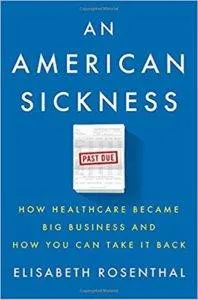 An American Sickness by Elisabeth Rosenthal
Rosenthal makes a detailed case showing how our healthcare system is corrupt from top to bottom, proving our society is greed driven. Most people assume healthcare is a boring, but Rosenthal makes it fascinating. And we all need to learn what’s in this book before we get a surprised $375,000 hospital bill for services not covered by our insurance.
—James Wallace Harris
An American Sickness by Elisabeth Rosenthal
Rosenthal makes a detailed case showing how our healthcare system is corrupt from top to bottom, proving our society is greed driven. Most people assume healthcare is a boring, but Rosenthal makes it fascinating. And we all need to learn what’s in this book before we get a surprised $375,000 hospital bill for services not covered by our insurance.
—James Wallace Harris
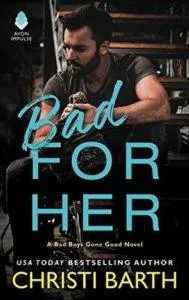 Bad for Her by Christi Barth (Avon Impulse, Oct 3rd)
Almost immediately after picking up this book I fell hard for Rafe Maguire, the former Chicago mobster now in WITSEC. Mollie Vickers, small-town Oregon doctor fell hard for him, too. Their story was full of sweet everyday moments. You know: shared text messages, lunch with the local chamber of commerce, sexy times in a forest…usual stuff. All that usual, regular stuff, though, made for an incredibly fun contemporary romance that features a bad boy who has gone so, so good.
—Erin McCoy
Bad for Her by Christi Barth (Avon Impulse, Oct 3rd)
Almost immediately after picking up this book I fell hard for Rafe Maguire, the former Chicago mobster now in WITSEC. Mollie Vickers, small-town Oregon doctor fell hard for him, too. Their story was full of sweet everyday moments. You know: shared text messages, lunch with the local chamber of commerce, sexy times in a forest…usual stuff. All that usual, regular stuff, though, made for an incredibly fun contemporary romance that features a bad boy who has gone so, so good.
—Erin McCoy
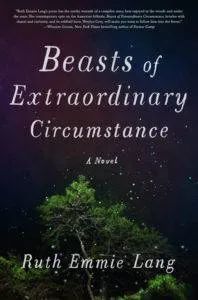 Beasts of Extraordinary Circumstance by Ruth Emmie Lang
I read this book on the first of September and it has stayed with me all month. The story is whimsical and gorgeous. The writing is just beautiful. And it made me smile the entire time. It tells the story of Weylyn Grey, told through the eyes of people who have encountered him throughout his entire life. After his parents die in a freak storm, Weylyn is brought up by a pack of wolves in Michigan. In the woods, he befriends Mary, the daughter of the local butcher. There his adventure really picks up as Weylyn moves across the United States and comes to term with his mysterious gifts. To all those wary of magical realism novels—give Beasts a chance. I don’t read a lot of MR and I loved this with a passion.
—Kate Krug
Beasts of Extraordinary Circumstance by Ruth Emmie Lang
I read this book on the first of September and it has stayed with me all month. The story is whimsical and gorgeous. The writing is just beautiful. And it made me smile the entire time. It tells the story of Weylyn Grey, told through the eyes of people who have encountered him throughout his entire life. After his parents die in a freak storm, Weylyn is brought up by a pack of wolves in Michigan. In the woods, he befriends Mary, the daughter of the local butcher. There his adventure really picks up as Weylyn moves across the United States and comes to term with his mysterious gifts. To all those wary of magical realism novels—give Beasts a chance. I don’t read a lot of MR and I loved this with a passion.
—Kate Krug
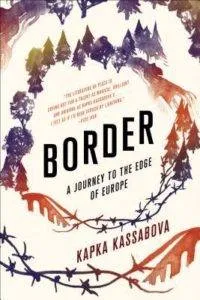 Border: A Journey to the Edge of Europe by Kapka Kassabova
The “edge of Europe” of Kassabova’s title is the border connecting (dividing?) Bulgaria, Greece, and Turkey. Border explores the history of the area and how the people living there have fared over the centuries through such tumultuous events as the rise and fall of the Soviet Union and the current refugee crisis. Kassabova describes her childhood in the region and her recent travels through it, telling stories of the people she meets and the marvelous and terrifying landscapes she travels through. Her book is a fascinating look into what borders are and how they have shaped individual lives and how people have understood themselves and others.
—Rebecca Hussey
Border: A Journey to the Edge of Europe by Kapka Kassabova
The “edge of Europe” of Kassabova’s title is the border connecting (dividing?) Bulgaria, Greece, and Turkey. Border explores the history of the area and how the people living there have fared over the centuries through such tumultuous events as the rise and fall of the Soviet Union and the current refugee crisis. Kassabova describes her childhood in the region and her recent travels through it, telling stories of the people she meets and the marvelous and terrifying landscapes she travels through. Her book is a fascinating look into what borders are and how they have shaped individual lives and how people have understood themselves and others.
—Rebecca Hussey
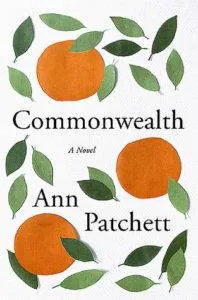 Commonwealth by Ann Patchett
Spanning five decades, we watch families merge when Bert Cousins and Beverly Keating get married and bond their six children—her two, his four—together over summer vacations in Virginia. The step siblings aren’t supervised often. A bad thing happens. As they grow up, they grow apart. Until Franny dates an author, tells him stories about those summers, and that one summer in particular, and her story gets published. The family secrets are out, and what remains of the family comes back together. This book is just gorgeous. When I think about it, I taste orange juice.
—Ashley Holstrom
Commonwealth by Ann Patchett
Spanning five decades, we watch families merge when Bert Cousins and Beverly Keating get married and bond their six children—her two, his four—together over summer vacations in Virginia. The step siblings aren’t supervised often. A bad thing happens. As they grow up, they grow apart. Until Franny dates an author, tells him stories about those summers, and that one summer in particular, and her story gets published. The family secrets are out, and what remains of the family comes back together. This book is just gorgeous. When I think about it, I taste orange juice.
—Ashley Holstrom
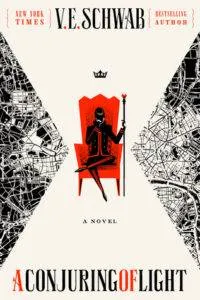 A Conjuring of Light by V. E. Schwab
The final novel in Schwab’s Shades of Magic series released this year, and when I found a signed copy at Comic Con, I couldn’t resist. This series hooked me from the first pages with its richly developed magical world, complex characters, and modern feel. The final book in this series delivers a satisfying final adventure and conclusion.
—Emily Wenstrom
A Conjuring of Light by V. E. Schwab
The final novel in Schwab’s Shades of Magic series released this year, and when I found a signed copy at Comic Con, I couldn’t resist. This series hooked me from the first pages with its richly developed magical world, complex characters, and modern feel. The final book in this series delivers a satisfying final adventure and conclusion.
—Emily Wenstrom
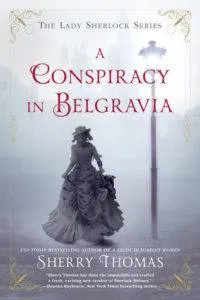 A Conspiracy in Belgravia by Sherry Thomas
My favorite thing about the two Charlotte Holmes books so far is the way Sherry Thomas takes a structure that could be predictable and does something unique with it. In her first book, A Study in Scarlet Women, she turns the familiar Sherlock Holmes formula on its head by introducing the challenges a single woman would face in the role of detective. In this excellent follow-up, Thomas takes a premise that seems ripe for soapy drama—Charlotte agrees to secretly help the wife of the man she wants but can’t have—and twists it by using the calm and analytical Charlotte to drive the story. That emotion is only occasionally able to infiltrate the logical detective’s thoughts and actions makes the character and the book all the more compelling.
—Trisha Brown
A Conspiracy in Belgravia by Sherry Thomas
My favorite thing about the two Charlotte Holmes books so far is the way Sherry Thomas takes a structure that could be predictable and does something unique with it. In her first book, A Study in Scarlet Women, she turns the familiar Sherlock Holmes formula on its head by introducing the challenges a single woman would face in the role of detective. In this excellent follow-up, Thomas takes a premise that seems ripe for soapy drama—Charlotte agrees to secretly help the wife of the man she wants but can’t have—and twists it by using the calm and analytical Charlotte to drive the story. That emotion is only occasionally able to infiltrate the logical detective’s thoughts and actions makes the character and the book all the more compelling.
—Trisha Brown
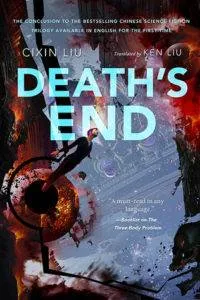 Death’s End by Cixin Liu, translated by Ken Liu
This is the last book in Cixin Liu’s grand, indescribably ambitious trilogy, Remembrance of Earth’s Past. It has the largest scope I’ve ever come across in a science fiction novel, and the most intense ideas and concepts I’ve come across in any type of literature. This book was more of an experience for me to go through rather than a book.
—Mya Nunnally
Death’s End by Cixin Liu, translated by Ken Liu
This is the last book in Cixin Liu’s grand, indescribably ambitious trilogy, Remembrance of Earth’s Past. It has the largest scope I’ve ever come across in a science fiction novel, and the most intense ideas and concepts I’ve come across in any type of literature. This book was more of an experience for me to go through rather than a book.
—Mya Nunnally
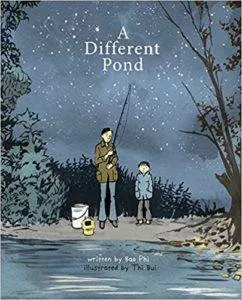 A Different Pond by Bao Phi, illustrated by Thi Bui
This is a picture book about a refugee family from Vietnam who makes a home in the United States. The story begins with a father waking up his son early in the morning so they can go fishing to catch food for dinner. Through dialogue, it becomes known that the father works two jobs, the mother works, and the son takes care of his younger sibling during the day. Gorgeously written with beautiful illustrations, I think that everyone—no matter their age—should read this picture book.
—Karina Glaser
A Different Pond by Bao Phi, illustrated by Thi Bui
This is a picture book about a refugee family from Vietnam who makes a home in the United States. The story begins with a father waking up his son early in the morning so they can go fishing to catch food for dinner. Through dialogue, it becomes known that the father works two jobs, the mother works, and the son takes care of his younger sibling during the day. Gorgeously written with beautiful illustrations, I think that everyone—no matter their age—should read this picture book.
—Karina Glaser
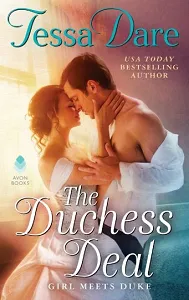 The Duchess Deal by Tessa Dare
This was the last book I read in September, and it was just the time to read something heartwarming and hilarious. A take on Beauty and the Beast, it features a seamstress down on her luck and a misanthropic duke with half a body covered in scars thanks to an artillery mishap. The pair enter a marriage of convenience, no love allowed, but they have some serious chemistry that fights them every step of the way. Complete with Tessa Dare’s usual wit and charm, incredibly clever Shakespearean insults, not to mention a few—okay, one—of my favorite new side characters in historical romance, this book was a perfect way to wrap up September.
—Jessica Pryde
The Duchess Deal by Tessa Dare
This was the last book I read in September, and it was just the time to read something heartwarming and hilarious. A take on Beauty and the Beast, it features a seamstress down on her luck and a misanthropic duke with half a body covered in scars thanks to an artillery mishap. The pair enter a marriage of convenience, no love allowed, but they have some serious chemistry that fights them every step of the way. Complete with Tessa Dare’s usual wit and charm, incredibly clever Shakespearean insults, not to mention a few—okay, one—of my favorite new side characters in historical romance, this book was a perfect way to wrap up September.
—Jessica Pryde
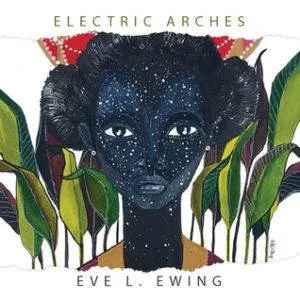 Electric Arches by Eve L. Ewing
This hybrid collection of poetry, prose, and art is chock-full of youthful wonder and sharp cultural critique. Ewing examines Chicago’s segregation, racial injustice, police brutality, and black girlhood in vignettes that veer from stark realism to the fantastical. However, what makes this collection a true standout is its accessibility. Electric Arches feels designed to be meaningful for young students and adults in equal measure. The poems don’t obfuscate; instead, they provide meaning upfront and challenge the reader to think about the larger meaning. The book is beautiful as both a physical object and cultural artifact. It’s not to be missed.
—Aram Mrjoian
Electric Arches by Eve L. Ewing
This hybrid collection of poetry, prose, and art is chock-full of youthful wonder and sharp cultural critique. Ewing examines Chicago’s segregation, racial injustice, police brutality, and black girlhood in vignettes that veer from stark realism to the fantastical. However, what makes this collection a true standout is its accessibility. Electric Arches feels designed to be meaningful for young students and adults in equal measure. The poems don’t obfuscate; instead, they provide meaning upfront and challenge the reader to think about the larger meaning. The book is beautiful as both a physical object and cultural artifact. It’s not to be missed.
—Aram Mrjoian
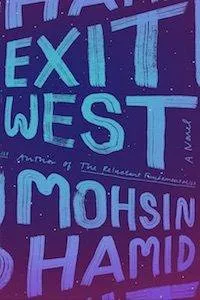 Exit West by Mohsin Hamid
When I sat down to read the first few pages of Exit West, I was floored. I couldn’t finish How to Get Filthy Rich in Rising Asia, so I’m glad I gave Mohsin Hamid another chance: Exit West might be the best book I’ve read all year. The writing took my breath away! It was so validating reading someone else who writes in these big, broken up sentences that could be accused of rambling if not for the sheer beauty and magic spilling everywhere. But where my sentences feel clunky, like I’m falling down stairs, and there’s coffee spilling all over the place and phrases flyin’ like they’ll fall outta my bags, Hamid’s prose feels like you have six different magic spells going on at the same time, each coloring a scene so crazy vivid that you don’t realize you’ve been holding your breath until you find the end of the sentence and each layer astounds. The story itself is just as haunting as the prose. Saeed and Nadia are young adults, living in an increasingly war-torn country in the Middle East. As everyday life crumbles around them and their fledgling love story becomes understandably more difficult to navigate, Nadia (a striking, complex feminist; I love her) and Saeed adventure after mysterious doors that are rumored to open to other parts of the world, away from the fighting. That’s when the story gets flipped, turned upside down. If the first half flowers in the wonder and magic of familial ties and responsibility, the romanticism of ideals, and the intimacy of new love, then the second half offers a more tempered realism that (gently, so gently) saves the story from collapsing becoming too saccharine. Exit West is a story that questions the possibility of escape, the elasticity of identity, and the terrifying power of transformation.
—Katie Hardy
Exit West by Mohsin Hamid
When I sat down to read the first few pages of Exit West, I was floored. I couldn’t finish How to Get Filthy Rich in Rising Asia, so I’m glad I gave Mohsin Hamid another chance: Exit West might be the best book I’ve read all year. The writing took my breath away! It was so validating reading someone else who writes in these big, broken up sentences that could be accused of rambling if not for the sheer beauty and magic spilling everywhere. But where my sentences feel clunky, like I’m falling down stairs, and there’s coffee spilling all over the place and phrases flyin’ like they’ll fall outta my bags, Hamid’s prose feels like you have six different magic spells going on at the same time, each coloring a scene so crazy vivid that you don’t realize you’ve been holding your breath until you find the end of the sentence and each layer astounds. The story itself is just as haunting as the prose. Saeed and Nadia are young adults, living in an increasingly war-torn country in the Middle East. As everyday life crumbles around them and their fledgling love story becomes understandably more difficult to navigate, Nadia (a striking, complex feminist; I love her) and Saeed adventure after mysterious doors that are rumored to open to other parts of the world, away from the fighting. That’s when the story gets flipped, turned upside down. If the first half flowers in the wonder and magic of familial ties and responsibility, the romanticism of ideals, and the intimacy of new love, then the second half offers a more tempered realism that (gently, so gently) saves the story from collapsing becoming too saccharine. Exit West is a story that questions the possibility of escape, the elasticity of identity, and the terrifying power of transformation.
—Katie Hardy
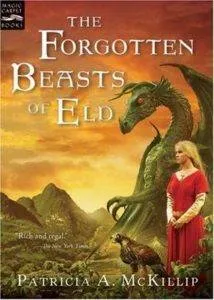 The Forgotten Beasts of Eld by Patricia McKillip
Badass lady wizard alert! I’ve come to McKillip only recently, and I’m cherishing the experience. Her prose is like poetry; her plots subtle; her characters heartbreaking. When I first began reading Eld, I thought I recognized the story. A young boy comes to live with his wizard aunt to hide from his father the king. Oh, and wizard aunt has a dragon, a riddling boar, a giant falcon. But the plot took an unexpected turn. As the story progressed, I realised McKillip had something far more poignant and beautiful in mind. And it really is a beautiful novel. I cannot recommend it highly enough for fantasy fans. If you haven’t read her before, come join me in cherishing her novels bit by bit. And if you have read her before, I bet Eld is one you reread often.
—Margaret Kingsbury
The Forgotten Beasts of Eld by Patricia McKillip
Badass lady wizard alert! I’ve come to McKillip only recently, and I’m cherishing the experience. Her prose is like poetry; her plots subtle; her characters heartbreaking. When I first began reading Eld, I thought I recognized the story. A young boy comes to live with his wizard aunt to hide from his father the king. Oh, and wizard aunt has a dragon, a riddling boar, a giant falcon. But the plot took an unexpected turn. As the story progressed, I realised McKillip had something far more poignant and beautiful in mind. And it really is a beautiful novel. I cannot recommend it highly enough for fantasy fans. If you haven’t read her before, come join me in cherishing her novels bit by bit. And if you have read her before, I bet Eld is one you reread often.
—Margaret Kingsbury
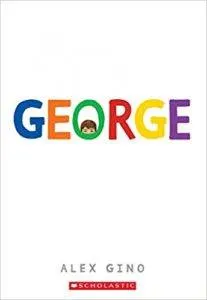 George by Alex Gino
I’d heard great things about this book from when it was first published, but since I don’t usually read children’s fiction as an adult, it took me awhile to get around to this one. Oh. My. Goodness. If you haven’t read this book yet, you are missing out! The main character’s name is George, but George hates living like a boy and being treated like a boy. When she learns that her class is going to be putting on Charlotte’s Web as a school play, she and her best friend Kelly devise a plan so that George can play the part of Charlotte (a role typically reserved for a girl) and show everyone who she truly is inside. Not surprisingly, this book has been on ALA’s Top 10 List of Banned/Challenged Books since it was first published because of its straightforward discussion of transgender issues, but this is a wonderfully empathetic story about a child coming to terms with their identity, and learning how to accept who she is. It’s funny and sweet and sad and joyous and by the time I finished the book I wanted to give it to everyone I knew—adults AND children. Seriously, do yourself a favor and read this book. It’s an absolute delight.
—Katie McLain
George by Alex Gino
I’d heard great things about this book from when it was first published, but since I don’t usually read children’s fiction as an adult, it took me awhile to get around to this one. Oh. My. Goodness. If you haven’t read this book yet, you are missing out! The main character’s name is George, but George hates living like a boy and being treated like a boy. When she learns that her class is going to be putting on Charlotte’s Web as a school play, she and her best friend Kelly devise a plan so that George can play the part of Charlotte (a role typically reserved for a girl) and show everyone who she truly is inside. Not surprisingly, this book has been on ALA’s Top 10 List of Banned/Challenged Books since it was first published because of its straightforward discussion of transgender issues, but this is a wonderfully empathetic story about a child coming to terms with their identity, and learning how to accept who she is. It’s funny and sweet and sad and joyous and by the time I finished the book I wanted to give it to everyone I knew—adults AND children. Seriously, do yourself a favor and read this book. It’s an absolute delight.
—Katie McLain
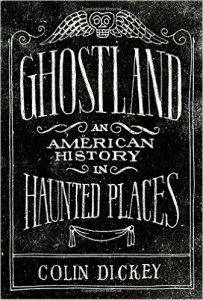 Ghostland by Colin Dickey
I expected Ghostland: An American History in Haunted Places to be a fun, spooky fall read. And it is, but it’s so much more than that. Dickey gives readers a whirlwind tour of some of America’s most famous haunted houses, hotels, brothels, bars, asylums, and graveyards. But it’s not the alleged hauntings themselves that drive the narrative. Rather, it is what these ghost stories say about our cultural anxieties, fears, and obsessions that Dickey seeks to uncover. In the process, he takes readers back in time to the madness of the Salem Witch Trials, the horror of southern slave plantations, and the parlors where the women of the 19th century spiritualist movement found power before suffrage. If you enjoy solid history flavored with a hint of mystery and the paranormal, you will love this book!
—Kate Scott
Ghostland by Colin Dickey
I expected Ghostland: An American History in Haunted Places to be a fun, spooky fall read. And it is, but it’s so much more than that. Dickey gives readers a whirlwind tour of some of America’s most famous haunted houses, hotels, brothels, bars, asylums, and graveyards. But it’s not the alleged hauntings themselves that drive the narrative. Rather, it is what these ghost stories say about our cultural anxieties, fears, and obsessions that Dickey seeks to uncover. In the process, he takes readers back in time to the madness of the Salem Witch Trials, the horror of southern slave plantations, and the parlors where the women of the 19th century spiritualist movement found power before suffrage. If you enjoy solid history flavored with a hint of mystery and the paranormal, you will love this book!
—Kate Scott
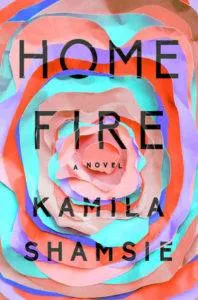 Home Fire by Kamila Shamsie
When I saw this book on the Booker longlist I finally got myself into gear and decided I needed to read it right now. It was a good decision. Writing about terrorism, its impact on Muslim communities, and other complex issues of race, religion, and immigration can either feel detached from reality or reek of an after-school special. But Shamsie’s story and characters feel like real people you know, while the big stories that impact these characters’ lives also feel like ripped-from-the-headlines stories you recognize. This is a book that’s big on plot but also relishes small moments and the inner lives of its characters with a multiple point-of-view structure. It’s one of my favorite books this year.
—Jessica Woodbury
Home Fire by Kamila Shamsie
When I saw this book on the Booker longlist I finally got myself into gear and decided I needed to read it right now. It was a good decision. Writing about terrorism, its impact on Muslim communities, and other complex issues of race, religion, and immigration can either feel detached from reality or reek of an after-school special. But Shamsie’s story and characters feel like real people you know, while the big stories that impact these characters’ lives also feel like ripped-from-the-headlines stories you recognize. This is a book that’s big on plot but also relishes small moments and the inner lives of its characters with a multiple point-of-view structure. It’s one of my favorite books this year.
—Jessica Woodbury
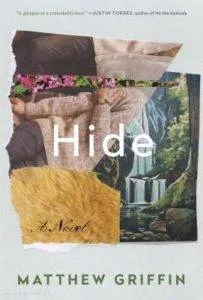 Hide by Matthew Griffin
This book was physically painful to read, in the best possible way. I found myself often having to put it down for a moment to take a breath and ease the aching in my chest. It’s the story of a gay couple in their 80s, who fell in love just after WWII in rural North Carolina. In order to share a life together, they chose to cut themselves off from the world. When Frank has a stroke and Wendell is left to care for him, they’re forced to confront what they’ve given up for each other. It’s a complicated, nuanced, and searingly honest portrait of a marriage. It’s also one of the most intimate and gorgeously written portrayals of old age and illness that I have ever read. There were several scenes so perfectly rendered and heartbreakingly detailed that they left me with shivers.
—Laura Sackton
Hide by Matthew Griffin
This book was physically painful to read, in the best possible way. I found myself often having to put it down for a moment to take a breath and ease the aching in my chest. It’s the story of a gay couple in their 80s, who fell in love just after WWII in rural North Carolina. In order to share a life together, they chose to cut themselves off from the world. When Frank has a stroke and Wendell is left to care for him, they’re forced to confront what they’ve given up for each other. It’s a complicated, nuanced, and searingly honest portrait of a marriage. It’s also one of the most intimate and gorgeously written portrayals of old age and illness that I have ever read. There were several scenes so perfectly rendered and heartbreakingly detailed that they left me with shivers.
—Laura Sackton
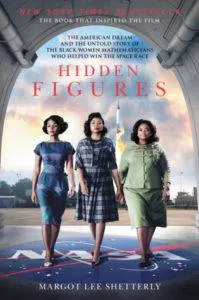 Hidden Figures: The American Dream and the Untold Story of the Black Women Mathematicians Who Helped Win the Space Race by Margot Lee Shetterly
In education and pop culture about American history, African-Americans are often limited to two contexts—slavery and civil rights. When it comes to other periods and events in history—space, wars (other than the Civil War), whatever—it as if non-white people and women of any hue largely didn’t exist. To the extent the existence of women and minorities is acknowledged, they are often confined to a supporting role like maid, wife, or secretary. While supporting roles are extremely important, they are not the only way women and minorities have contributed to American history. In Hidden Figures Ms. Shetterly proves that by exploring the work of African-American women at NASA and its predecessor, work that helped make it possible for America to explore space. It is an amazing true story, one more people should know about. If you saw the movie, great, but the book is even better.
—Tiffani Willis
Hidden Figures: The American Dream and the Untold Story of the Black Women Mathematicians Who Helped Win the Space Race by Margot Lee Shetterly
In education and pop culture about American history, African-Americans are often limited to two contexts—slavery and civil rights. When it comes to other periods and events in history—space, wars (other than the Civil War), whatever—it as if non-white people and women of any hue largely didn’t exist. To the extent the existence of women and minorities is acknowledged, they are often confined to a supporting role like maid, wife, or secretary. While supporting roles are extremely important, they are not the only way women and minorities have contributed to American history. In Hidden Figures Ms. Shetterly proves that by exploring the work of African-American women at NASA and its predecessor, work that helped make it possible for America to explore space. It is an amazing true story, one more people should know about. If you saw the movie, great, but the book is even better.
—Tiffani Willis
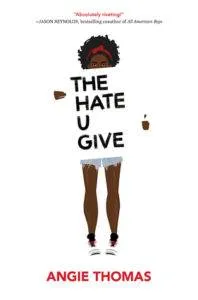 The Hate U Give by Angie Thomas
This is a book everyone should read to understand better the pressure, oppression, and social inequality black people in general, and specifically in America, have to deal with since birth. It’s a fictitious story with a lot of truth to it, and if you don’t feel anger when you are reading it, anger for this messed up society which privileges the white and the rich, then you are part of the problem. It made me fear for the characters’ lives and it also made me realise I probably couldn’t live with the sort of fear the main characters have to live every single day. A powerful story that we should all pass on to others.
—Carina Pereira
The Hate U Give by Angie Thomas
This is a book everyone should read to understand better the pressure, oppression, and social inequality black people in general, and specifically in America, have to deal with since birth. It’s a fictitious story with a lot of truth to it, and if you don’t feel anger when you are reading it, anger for this messed up society which privileges the white and the rich, then you are part of the problem. It made me fear for the characters’ lives and it also made me realise I probably couldn’t live with the sort of fear the main characters have to live every single day. A powerful story that we should all pass on to others.
—Carina Pereira
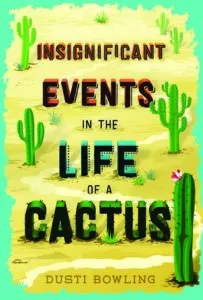 Insignificant Events in the Life of a Cactus by Dusti Bowling
I feel like I have a really good track record when it comes to reading amazing intermediate books. I don’t read nearly as many of them as I would like, but when I do pick one up, it’s always fantastic. Case in point: this wonderful and often funny story about Aven, a thirteen-year-old girl with no arms. Aven doesn’t need anyone’s pity: she can do anything anyone else can do, she just does it with her feet instead. She has grown up in Kansas her whole life, going to school with the same kids. They know her and how she likes to make jokes about losing her arms to ninjas and coyotes. But when Aven learns her family is moving to Arizona for her dad’s new job, she stresses about all the strangers she will encounter who will stare and ask questions and make fun of her. Luckily she makes a friend right away: Connor, a boy with Tourette Syndrome, who feels as much an outsider as she does. Together they explore Stagecoach Pass, the western-themed amusement park her father now manages, try and solve a murder mystery, and learn to face their doubts and fears together. So many heart eye emojis for this one.
—Liberty Hardy
Insignificant Events in the Life of a Cactus by Dusti Bowling
I feel like I have a really good track record when it comes to reading amazing intermediate books. I don’t read nearly as many of them as I would like, but when I do pick one up, it’s always fantastic. Case in point: this wonderful and often funny story about Aven, a thirteen-year-old girl with no arms. Aven doesn’t need anyone’s pity: she can do anything anyone else can do, she just does it with her feet instead. She has grown up in Kansas her whole life, going to school with the same kids. They know her and how she likes to make jokes about losing her arms to ninjas and coyotes. But when Aven learns her family is moving to Arizona for her dad’s new job, she stresses about all the strangers she will encounter who will stare and ask questions and make fun of her. Luckily she makes a friend right away: Connor, a boy with Tourette Syndrome, who feels as much an outsider as she does. Together they explore Stagecoach Pass, the western-themed amusement park her father now manages, try and solve a murder mystery, and learn to face their doubts and fears together. So many heart eye emojis for this one.
—Liberty Hardy
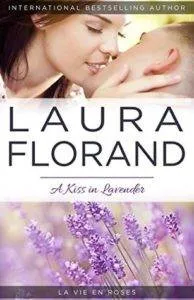 A Kiss in Lavender (Le Vie en Roses #4) by Laura Florand
Probably the best book of this entire series, A Kiss in Lavender follows the homecoming of the mysterious and long-absent Lucien Rosier, who ran away from home at nineteen to join the Foreign Legion. After fifteen years, his Tante Colette asks Elena Lyon to track him down. Some parts of this book were a little difficult to buy into because Elena seemed like a legit crazy person (I would have appreciated one or two scenes with that therapist she was always promising she was going to start seeing, just to know the issues were indeed being worked on). I found myself thinking Lucien must have the patience of a saint. But at the same time, it’s a truly heartwarming book about coming back home and not so much recognizing your place in the world as making decisions about where and who you want to be. I think the romance arc is also the most emotionally satisfying of the whole series. If you’re a Florand fan, you’ll want to read this asap.
–Tasha Brandstatter
A Kiss in Lavender (Le Vie en Roses #4) by Laura Florand
Probably the best book of this entire series, A Kiss in Lavender follows the homecoming of the mysterious and long-absent Lucien Rosier, who ran away from home at nineteen to join the Foreign Legion. After fifteen years, his Tante Colette asks Elena Lyon to track him down. Some parts of this book were a little difficult to buy into because Elena seemed like a legit crazy person (I would have appreciated one or two scenes with that therapist she was always promising she was going to start seeing, just to know the issues were indeed being worked on). I found myself thinking Lucien must have the patience of a saint. But at the same time, it’s a truly heartwarming book about coming back home and not so much recognizing your place in the world as making decisions about where and who you want to be. I think the romance arc is also the most emotionally satisfying of the whole series. If you’re a Florand fan, you’ll want to read this asap.
–Tasha Brandstatter
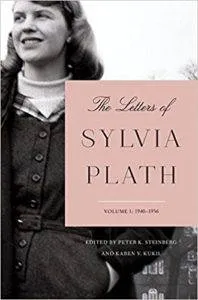 The Letters of Sylvia Plath, Volume 1 by Sylvia Plath
Clocking in at more than 1000 pages, this is not an easy read, but as someone who loves all things Sivvy, I have loved reading these letters. There’s something so intimate about reading someone’s letters, and I’ve enjoyed “getting to know” Plath better. (Forthcoming October 17.)
—Jaime Herndon
The Letters of Sylvia Plath, Volume 1 by Sylvia Plath
Clocking in at more than 1000 pages, this is not an easy read, but as someone who loves all things Sivvy, I have loved reading these letters. There’s something so intimate about reading someone’s letters, and I’ve enjoyed “getting to know” Plath better. (Forthcoming October 17.)
—Jaime Herndon
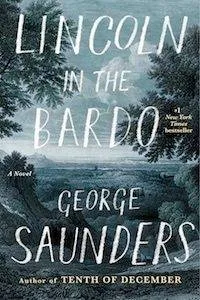 Lincoln in the Bardo by George Saunders
Who’d a thunk that Buddhism and Abraham Lincoln would go together like chocolate and peanut butter? It’s such an odd experience, with 100+ narrators (some real and some fictional and some who are ghosts), talking about Lincoln’s son Willie going through purgatory. But it’s also a great portrait of Lincoln on an awful day, and a really touching tribute to grief and moving on. It’s Spoon River Anthology on caffeine.
Plus, the audiobook is WILD. Hope you like lots of narrators, ’cause there are 166 voice actors on this one!
—Zachary Littrell
Lincoln in the Bardo by George Saunders
Who’d a thunk that Buddhism and Abraham Lincoln would go together like chocolate and peanut butter? It’s such an odd experience, with 100+ narrators (some real and some fictional and some who are ghosts), talking about Lincoln’s son Willie going through purgatory. But it’s also a great portrait of Lincoln on an awful day, and a really touching tribute to grief and moving on. It’s Spoon River Anthology on caffeine.
Plus, the audiobook is WILD. Hope you like lots of narrators, ’cause there are 166 voice actors on this one!
—Zachary Littrell
 Long Way Down by Jason Reynolds
I’ve read and enjoyed each of Reynolds’s YA books, but this one takes the spot as my favorite. This fast-paced verse novel is about a boy itching to take revenge on the person who killed his older brother. It takes place over the course of seconds in an elevator; along each stop, Will meets someone he knows whose life has been impacted by violence.
But it’s the last page, that last line, that makes this book go from compelling to out-of-this-world powerful. Rarely do books give me chills, but this one did, and I can’t wait to press it into the hands of every reader possible. Reynolds is at the top of his game and I can’t wait to see what he writes next.
—Kelly Jensen
Long Way Down by Jason Reynolds
I’ve read and enjoyed each of Reynolds’s YA books, but this one takes the spot as my favorite. This fast-paced verse novel is about a boy itching to take revenge on the person who killed his older brother. It takes place over the course of seconds in an elevator; along each stop, Will meets someone he knows whose life has been impacted by violence.
But it’s the last page, that last line, that makes this book go from compelling to out-of-this-world powerful. Rarely do books give me chills, but this one did, and I can’t wait to press it into the hands of every reader possible. Reynolds is at the top of his game and I can’t wait to see what he writes next.
—Kelly Jensen
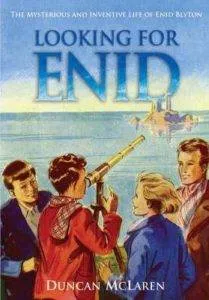 Looking for Enid by Duncan Mclaren.
This is possible one of the strangest books about an author and possibly also one of the best that I’ve ever read. Enid Blyton is a landmark figure in children’s literature and McLaren’s idiosyncratic, distinct, and eccentric investigation of her is an oddly fitting tribute. McLaren roams briskly through discussion of Blyton’s life, interspersing it with what can only be deemed as fanfic, and perhaps a little bit too much detail about his own sex life. This isn’t your normal biography by any means, but it’s kind of unputdownable.
—Daisy Johnson
Looking for Enid by Duncan Mclaren.
This is possible one of the strangest books about an author and possibly also one of the best that I’ve ever read. Enid Blyton is a landmark figure in children’s literature and McLaren’s idiosyncratic, distinct, and eccentric investigation of her is an oddly fitting tribute. McLaren roams briskly through discussion of Blyton’s life, interspersing it with what can only be deemed as fanfic, and perhaps a little bit too much detail about his own sex life. This isn’t your normal biography by any means, but it’s kind of unputdownable.
—Daisy Johnson
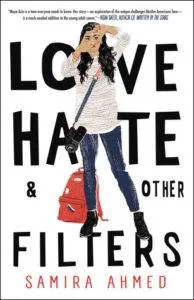 Love, Hate, and Other Filters by Samira Ahmed
Love, Hate, and Other Filters was honestly a highly anticipated read for me since it deals with the difficult topic of terrorism and Islamophobia. It didn’t disappoint. Maya is a really interesting, well developed protagonist who I could totally relate to. And the story of facing increased Islamophobia after a terror attack hit almost a little too close to home.
—Adiba Jaigirdar
Love, Hate, and Other Filters by Samira Ahmed
Love, Hate, and Other Filters was honestly a highly anticipated read for me since it deals with the difficult topic of terrorism and Islamophobia. It didn’t disappoint. Maya is a really interesting, well developed protagonist who I could totally relate to. And the story of facing increased Islamophobia after a terror attack hit almost a little too close to home.
—Adiba Jaigirdar
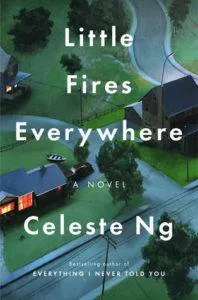 Little Fires Everywhere by Celeste Ng
I was a little skeptical at first about this book because it was super tough for me personally to get through Celeste Ng’s first novel. What I found was a story so full of depth and themes to make your head spin. It’s set in Shaker Heights, Ohio, which on the outside seems like a quaint little town until Mia and her daughter Pearl arrive and bring an outsider’s perspective to the story. But what it unpacks is so diverse. It’s about coming-of-age. It’s about getting older and remembering the person you were. It’s about the love of a mother. It’s about placement in the world and art and struggling to find truth in yourself and sacrifices and the truth in others. There was so much going on in this book that I was honestly surprised that it was only 300+ pages long.
—Simone Jung
Little Fires Everywhere by Celeste Ng
I was a little skeptical at first about this book because it was super tough for me personally to get through Celeste Ng’s first novel. What I found was a story so full of depth and themes to make your head spin. It’s set in Shaker Heights, Ohio, which on the outside seems like a quaint little town until Mia and her daughter Pearl arrive and bring an outsider’s perspective to the story. But what it unpacks is so diverse. It’s about coming-of-age. It’s about getting older and remembering the person you were. It’s about the love of a mother. It’s about placement in the world and art and struggling to find truth in yourself and sacrifices and the truth in others. There was so much going on in this book that I was honestly surprised that it was only 300+ pages long.
—Simone Jung
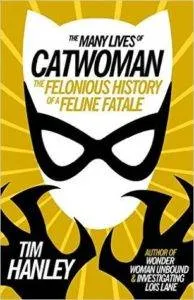 The Many Lives of Catwoman: The Felonious History of a Feline Fatale by Tim Hanley
I don’t read a ton of non-fiction and I have to be pretty impressed with any book to tolerate the sustained interruption of a Star Wars binge. The Many Lives of Catwoman was a phenomenal read which follows not only Selina Kyle’s career in comics but also explores the social and historical contexts for each of her various iterations. A great read for anyone interested in the character of Catwoman and for anyone who thinks comics are just colorful pictures devoid of deeper meaning (spoiler: they’re far, far more).
—S.W. Sondheimer
The Many Lives of Catwoman: The Felonious History of a Feline Fatale by Tim Hanley
I don’t read a ton of non-fiction and I have to be pretty impressed with any book to tolerate the sustained interruption of a Star Wars binge. The Many Lives of Catwoman was a phenomenal read which follows not only Selina Kyle’s career in comics but also explores the social and historical contexts for each of her various iterations. A great read for anyone interested in the character of Catwoman and for anyone who thinks comics are just colorful pictures devoid of deeper meaning (spoiler: they’re far, far more).
—S.W. Sondheimer
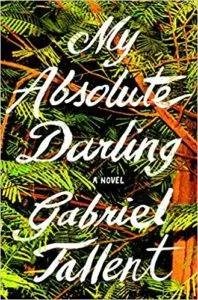 My Absolute Darling by Gabriel Tallent
The tale of teenage Turtle Alveston and her quest for safety and survival from an abusive father. Turtle is wild and spends her days deep in the redwoods of the Californian Coast, isolated and lost to the world, her only version of normality is her manipulative and sadistic father. A chance encounter with two precocious teenagers shines light in the cracks of Turtle’s version of reality, allowing her to see a way out. It’s Lolita meets Winter’s Bone and every bit horrible and haunting: read with caution.
—Laura Oosterbeek
My Absolute Darling by Gabriel Tallent
The tale of teenage Turtle Alveston and her quest for safety and survival from an abusive father. Turtle is wild and spends her days deep in the redwoods of the Californian Coast, isolated and lost to the world, her only version of normality is her manipulative and sadistic father. A chance encounter with two precocious teenagers shines light in the cracks of Turtle’s version of reality, allowing her to see a way out. It’s Lolita meets Winter’s Bone and every bit horrible and haunting: read with caution.
—Laura Oosterbeek
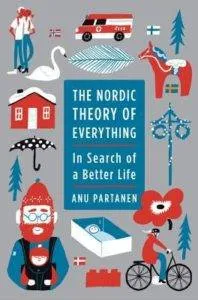 The Nordic Theory of Everything by Anu Partenen (Harper)
Written by a Finnish journalist who immigrated to America, this book examines the differences between the Nordic and American way of life in various arenas: family living, work/life balance, attitudes, healthcare. Partenen doesn’t present the Nordic way as a panacea that will fix everything that’s wrong with America, and nor does she ignore the positive aspects of American culture and life. Each chapter offers a critique of the American method as well as a potential solution.
I moved to America last year for the essentially the same reason as Partenen (we both moved here for love), and although my home country of Australia is not as progressive as Finland and other Nordic countries, there were (and are) many things about America that make me think, “How do you guys think that this okay? Really?” This book eloquently conveys many of the thoughts and feelings I have about the US. If you care about living a healthy, happy, independent, empowered life where you are truly free (and not the American notion of free which doesn’t really seem free at all), you should read this book.
—Jen Sherman
The Nordic Theory of Everything by Anu Partenen (Harper)
Written by a Finnish journalist who immigrated to America, this book examines the differences between the Nordic and American way of life in various arenas: family living, work/life balance, attitudes, healthcare. Partenen doesn’t present the Nordic way as a panacea that will fix everything that’s wrong with America, and nor does she ignore the positive aspects of American culture and life. Each chapter offers a critique of the American method as well as a potential solution.
I moved to America last year for the essentially the same reason as Partenen (we both moved here for love), and although my home country of Australia is not as progressive as Finland and other Nordic countries, there were (and are) many things about America that make me think, “How do you guys think that this okay? Really?” This book eloquently conveys many of the thoughts and feelings I have about the US. If you care about living a healthy, happy, independent, empowered life where you are truly free (and not the American notion of free which doesn’t really seem free at all), you should read this book.
—Jen Sherman
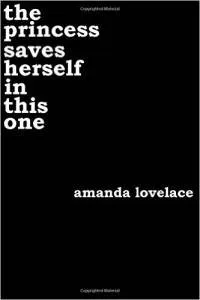 The Princess Saves Herself in this One by Amanda Lovelace
The title drew me to this book, but within a few pages it had become my new favorite book of poetry. Don’t get me wrong, I like poems. But I usually approach collections with the idea that I will read a few a day and take lots of breaks and only one or two will really stand out to me. But this book felt like a punch to the stomach…in a good way. Once I started reading, I couldn’t put it down. The sections the princess, the damsel, and the queen weave allegory and archetype together with reality to show three periods in the author’s life. The final section of the book gives the reader powerful encouragement and advice for living. These poems feel simple, powerful, and, perhaps more importantly, empowering. I’m very excited for the forthcoming sequel The Witch Doesn’t Burn in this One.
—Alison Doherty
The Princess Saves Herself in this One by Amanda Lovelace
The title drew me to this book, but within a few pages it had become my new favorite book of poetry. Don’t get me wrong, I like poems. But I usually approach collections with the idea that I will read a few a day and take lots of breaks and only one or two will really stand out to me. But this book felt like a punch to the stomach…in a good way. Once I started reading, I couldn’t put it down. The sections the princess, the damsel, and the queen weave allegory and archetype together with reality to show three periods in the author’s life. The final section of the book gives the reader powerful encouragement and advice for living. These poems feel simple, powerful, and, perhaps more importantly, empowering. I’m very excited for the forthcoming sequel The Witch Doesn’t Burn in this One.
—Alison Doherty
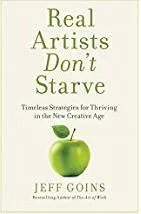 Real Artists Don’t Starve by Jeff Goins
Creating can be a lonely business. So can paying the bills. There is also the myth of the starving artist; that people can’t pay their bills doing what they love. Jeff Goins believes that someone who wants to create, to act, to perform, doesn’t have to accept that myth. He goes back to Michelangelo to dispel that myth, to say that we artists must fight for ourselves because we deserve more than creating for nothing. Inspiring, practical and motivational, Goins knows how to lift up his audience.
—Priya Sridhar
Real Artists Don’t Starve by Jeff Goins
Creating can be a lonely business. So can paying the bills. There is also the myth of the starving artist; that people can’t pay their bills doing what they love. Jeff Goins believes that someone who wants to create, to act, to perform, doesn’t have to accept that myth. He goes back to Michelangelo to dispel that myth, to say that we artists must fight for ourselves because we deserve more than creating for nothing. Inspiring, practical and motivational, Goins knows how to lift up his audience.
—Priya Sridhar
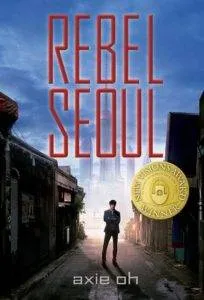 Rebel Seoul by Axie Oh
Do you want a bit of forbidden romance and government rebellion, all with a side of mech robots? The book has been described as Pacific Rim meets Korean action dramas and it absolutely delivers. Oh’s debut YA novel is set in a futuristic South Korea, where people are split between Old Seoul, ruled by gangs and poverty, and Neo Seoul, a stunningly-advanced world where a never-ending war rules the lives and careers of those who live there. Jaewon is our hero who helps us explore these two worlds—Old Seoul where he was abandoned as a child and had to fight to live on the streets, and Neo Seoul where those same abilities have made him one of the best combat pilots in his academy.
Rebel Seoul is an action-packed ride that somehow manages to slow down at the best times to show us the humanity of the people living in this world. All with some damn cool robots.
—Nikki VanRy
Rebel Seoul by Axie Oh
Do you want a bit of forbidden romance and government rebellion, all with a side of mech robots? The book has been described as Pacific Rim meets Korean action dramas and it absolutely delivers. Oh’s debut YA novel is set in a futuristic South Korea, where people are split between Old Seoul, ruled by gangs and poverty, and Neo Seoul, a stunningly-advanced world where a never-ending war rules the lives and careers of those who live there. Jaewon is our hero who helps us explore these two worlds—Old Seoul where he was abandoned as a child and had to fight to live on the streets, and Neo Seoul where those same abilities have made him one of the best combat pilots in his academy.
Rebel Seoul is an action-packed ride that somehow manages to slow down at the best times to show us the humanity of the people living in this world. All with some damn cool robots.
—Nikki VanRy
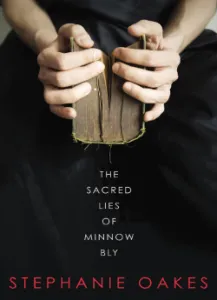 The Sacred Lies of Minnow Bly by Stephanie Oakes
I was really in the mood to read something dark, and when I picked up Oakes’ debut and read the back…a story about a teen girl who escaped a cult that cut off her hands…well, I knew I found the book I was searching for. It’s a YA novel that tells a story that’s horrifying, with prose that is beautiful and poetic, shifting from Minnow’s time in the cult to her present state in juvenile detention. As her mystery unravels thanks to an FBI agent that refuses to give up on her, you learn about the cult, her first love, and everything that led up to her hands being cut off. It’s sure to haunt you long after you’ve finished reading, and I’m all kinds of excited to start her latest novel, The Arsonist.
—Eric Smith
The Sacred Lies of Minnow Bly by Stephanie Oakes
I was really in the mood to read something dark, and when I picked up Oakes’ debut and read the back…a story about a teen girl who escaped a cult that cut off her hands…well, I knew I found the book I was searching for. It’s a YA novel that tells a story that’s horrifying, with prose that is beautiful and poetic, shifting from Minnow’s time in the cult to her present state in juvenile detention. As her mystery unravels thanks to an FBI agent that refuses to give up on her, you learn about the cult, her first love, and everything that led up to her hands being cut off. It’s sure to haunt you long after you’ve finished reading, and I’m all kinds of excited to start her latest novel, The Arsonist.
—Eric Smith
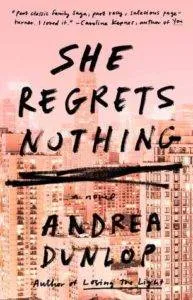 She Regrets Nothing By Andrea Dunlop
Scandal, social climbing and sad rich people—my personal catnip. This is very much a tale of modern, monied New York, but governed by the social rules of old. Our hero Laila Lawrence manages to walk a fine line between mercenary and sympathetic, and every character is a delight to follow.
—Rachel Weber
She Regrets Nothing By Andrea Dunlop
Scandal, social climbing and sad rich people—my personal catnip. This is very much a tale of modern, monied New York, but governed by the social rules of old. Our hero Laila Lawrence manages to walk a fine line between mercenary and sympathetic, and every character is a delight to follow.
—Rachel Weber
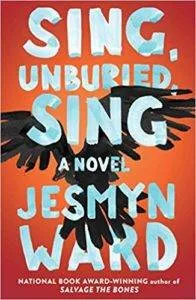 Sing, Unburied, Sing by Jesmyn Ward
This book has been getting a lot of critical attention and it is for good reason. Jesmyn Ward is a masterful writer. She creates atmospheric books and pulls readers into the world of her characters. Focusing on a Southern, rural, poor black family, Ward creates incredibly complicated characters who will break your heart.
—Rincey Abraham
Sing, Unburied, Sing by Jesmyn Ward
This book has been getting a lot of critical attention and it is for good reason. Jesmyn Ward is a masterful writer. She creates atmospheric books and pulls readers into the world of her characters. Focusing on a Southern, rural, poor black family, Ward creates incredibly complicated characters who will break your heart.
—Rincey Abraham
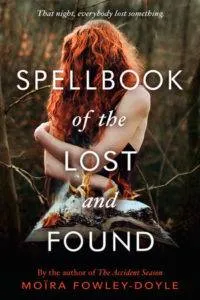 Spellbook for the Lost & Found by Moira Fowley-Doyle
I adored Fowley-Doyle’s debut novel, The Accident Season, and her sophomore release did not disappoint. Two best friends suffer the consequences of a spell to reclaim lost things and find themselves drawn into a magical mystery that has haunted their Irish town for years. This story has some sneaky queer girl rep that the summary doesn’t indicate, and I was downright delighted, and the romantic storylines were beautiful. The characters are all compelling and you’ll race through this book just to see how their paths intersect.
—Tirzah Price
Spellbook for the Lost & Found by Moira Fowley-Doyle
I adored Fowley-Doyle’s debut novel, The Accident Season, and her sophomore release did not disappoint. Two best friends suffer the consequences of a spell to reclaim lost things and find themselves drawn into a magical mystery that has haunted their Irish town for years. This story has some sneaky queer girl rep that the summary doesn’t indicate, and I was downright delighted, and the romantic storylines were beautiful. The characters are all compelling and you’ll race through this book just to see how their paths intersect.
—Tirzah Price
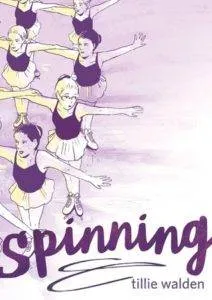 Spinning by Tillie Walden
Tillie Walden’s Spinning is a starkly beautiful memoir about a girl who is stuck in place: between youth and adulthood, between pursuing a preternatural gift for figure skating and embracing a burgeoning interest in art, between hiding from her desire and being led by her body and heart towards that very desire. Walden is an immensely talented artist, with a deft and graceful sense of composition that accentuates both the sport she is depicting and the emotionality of being a young woman on the cusp of adulthood, when everything feels at once bright and hazy.
—Michelle Hart
Spinning by Tillie Walden
Tillie Walden’s Spinning is a starkly beautiful memoir about a girl who is stuck in place: between youth and adulthood, between pursuing a preternatural gift for figure skating and embracing a burgeoning interest in art, between hiding from her desire and being led by her body and heart towards that very desire. Walden is an immensely talented artist, with a deft and graceful sense of composition that accentuates both the sport she is depicting and the emotionality of being a young woman on the cusp of adulthood, when everything feels at once bright and hazy.
—Michelle Hart
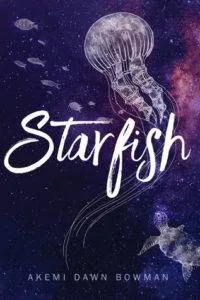 Starfish by Akemi Dawn Bowman
I feel like I’ve been evangelizing for this novel forever, but it’s only been just over a week since I read it. It definitely deserves praise though, as Akemi Dawn Bowman has written a story that I think a lot of teens and young adults will find themselves in, with a reminder that there is a way out of the darkness. Kiko is anxious and afraid and talented and resilient, and Bowman’s writing gives her a journey worthy of the person she is, and the person she will become. Plus, as a fellow art nerd, I really enjoyed seeing the way art breathes life into Kiko. Bowman is now one of my auto-buy authors, and I can’t wait to see what she does next.
—Angel Cruz
Starfish by Akemi Dawn Bowman
I feel like I’ve been evangelizing for this novel forever, but it’s only been just over a week since I read it. It definitely deserves praise though, as Akemi Dawn Bowman has written a story that I think a lot of teens and young adults will find themselves in, with a reminder that there is a way out of the darkness. Kiko is anxious and afraid and talented and resilient, and Bowman’s writing gives her a journey worthy of the person she is, and the person she will become. Plus, as a fellow art nerd, I really enjoyed seeing the way art breathes life into Kiko. Bowman is now one of my auto-buy authors, and I can’t wait to see what she does next.
—Angel Cruz
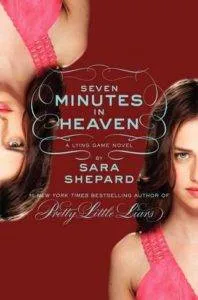 Seven Minutes in Heaven (The Lying Game #6) by Sara Shepard
In the last installment of The Lying Game series, Shepard closes the book on Sutton Mercer’s murder with a solid bang rather than a whimper. Jam-packed with creepy twists and eerie revelations, the finale caught me completely by surprise. But it’s totally fine. I’m never sleeping again.
—Jess Carbert
Seven Minutes in Heaven (The Lying Game #6) by Sara Shepard
In the last installment of The Lying Game series, Shepard closes the book on Sutton Mercer’s murder with a solid bang rather than a whimper. Jam-packed with creepy twists and eerie revelations, the finale caught me completely by surprise. But it’s totally fine. I’m never sleeping again.
—Jess Carbert
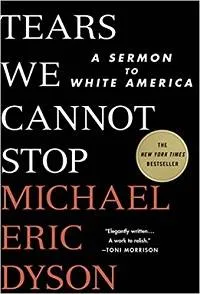 Tears We Cannot Stop: A Sermon to White America by Michael Eric Dyson
In this powerful book, Dyson, a sociologist and ordained minister, calls on white people to consider what it is like to be a black person in a country whose history is bound up in the oppression of black people. He shares story after story of experiences he and other black Americans have had with racism in America. Even more important, he directly addresses the arguments many white people make to deny racism. His discussion of patriotism versus nationalism and Colin Kaepernick’s protest against police violence was especially timely this month.
—Teresa Preston
Tears We Cannot Stop: A Sermon to White America by Michael Eric Dyson
In this powerful book, Dyson, a sociologist and ordained minister, calls on white people to consider what it is like to be a black person in a country whose history is bound up in the oppression of black people. He shares story after story of experiences he and other black Americans have had with racism in America. Even more important, he directly addresses the arguments many white people make to deny racism. His discussion of patriotism versus nationalism and Colin Kaepernick’s protest against police violence was especially timely this month.
—Teresa Preston
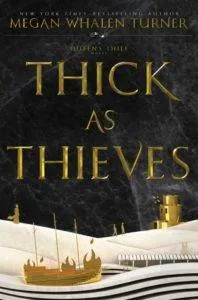 Thick as Thieves (The Queen’s Thief #5) by Megan Whalen Turner
I’ve been in love with The Queen’s Thief series since the day I accidentally read the third book in the series without reading the first two (whoops). Thick as Thieves is pretty different from the previous books in this incredible fantasy series, but it retains the same brilliant plot twists, vivid characterization, and detailed world-building. Absolutely worth a read if you like Megan Whalen Turner’s writing.
—Jessica Yang
Thick as Thieves (The Queen’s Thief #5) by Megan Whalen Turner
I’ve been in love with The Queen’s Thief series since the day I accidentally read the third book in the series without reading the first two (whoops). Thick as Thieves is pretty different from the previous books in this incredible fantasy series, but it retains the same brilliant plot twists, vivid characterization, and detailed world-building. Absolutely worth a read if you like Megan Whalen Turner’s writing.
—Jessica Yang
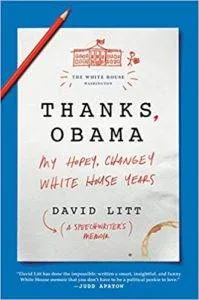 Thanks, Obama by David Litt
I haven’t finished this yet, but I’m ready to call it: I love it. David Litt was one of Obama’s speechwriters, and I’m enjoying travelling back in time to those happier, more innocent political times. I suspected too that his speechwriting credentials would make his memoir pleasant to read, and I was right—I particularly appreciate when form mirrors content, like the run-on sentences illustrating Obama’s style or the sentence-ending prepositions up with which Valerie Jarrett would not put. Oh, and it’s funny—and who doesn’t need a good laugh these days?
—Claire Handscombe
Thanks, Obama by David Litt
I haven’t finished this yet, but I’m ready to call it: I love it. David Litt was one of Obama’s speechwriters, and I’m enjoying travelling back in time to those happier, more innocent political times. I suspected too that his speechwriting credentials would make his memoir pleasant to read, and I was right—I particularly appreciate when form mirrors content, like the run-on sentences illustrating Obama’s style or the sentence-ending prepositions up with which Valerie Jarrett would not put. Oh, and it’s funny—and who doesn’t need a good laugh these days?
—Claire Handscombe
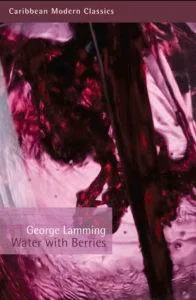 Water with Berries by George Lamming
A very, very, very loose reinterpretation of The Tempest by William Shakespeare, this book is a super neglected and overlooked bit of modernist literature that I think should be on everyone’s radar. About a group of Caribbean men living in London as bohemian artists, the novel explores the idea of home, of belonging, and of exile. There is discussion of race and colorism, of gender and scapegoating, and of the mind and imagination of artists and revolutionaries. It’s hard to describe the plot because there are a few threads, but as an anti-colonial text, it engages incredibly with the questions of what it means to be defined by one’s colonizer, to be tied to colonial discourse, and to attempt to disassociate oneself from it.
—Ilana Masad
Water with Berries by George Lamming
A very, very, very loose reinterpretation of The Tempest by William Shakespeare, this book is a super neglected and overlooked bit of modernist literature that I think should be on everyone’s radar. About a group of Caribbean men living in London as bohemian artists, the novel explores the idea of home, of belonging, and of exile. There is discussion of race and colorism, of gender and scapegoating, and of the mind and imagination of artists and revolutionaries. It’s hard to describe the plot because there are a few threads, but as an anti-colonial text, it engages incredibly with the questions of what it means to be defined by one’s colonizer, to be tied to colonial discourse, and to attempt to disassociate oneself from it.
—Ilana Masad
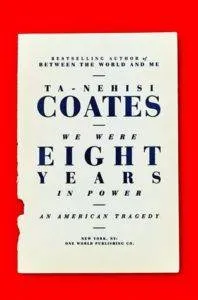 We Were Eight Years in Power by Ta-Nehisi Coates (One World, October 3)
This is an excellent collection of some of Ta-Nehisi Coates’ most groundbreaking work for The Atlantic. It also includes memoir-style commentary from Coates on his career and rise to prominence as one of the most notable writers and thinkers of our time, as well as his growing relationship with President Obama. You might note that if you’ve been following Coates’ writing for a while, this won’t all be new material for you. However, it’s fascinating to read his essays from a span of eight years in chronological order with social and political context added.
—Susie Dumond
We Were Eight Years in Power by Ta-Nehisi Coates (One World, October 3)
This is an excellent collection of some of Ta-Nehisi Coates’ most groundbreaking work for The Atlantic. It also includes memoir-style commentary from Coates on his career and rise to prominence as one of the most notable writers and thinkers of our time, as well as his growing relationship with President Obama. You might note that if you’ve been following Coates’ writing for a while, this won’t all be new material for you. However, it’s fascinating to read his essays from a span of eight years in chronological order with social and political context added.
—Susie Dumond
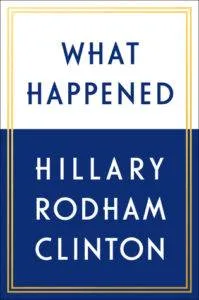 What Happened by Hillary Clinton
Ignore all of the thinkpieces you’ve seen about how this book is Hillary blaming other people for her loss. It’s clear that these people didn’t bother to read the book before commenting on it. Not only does Hillary take blame for the gaps in her campaign strategy that led us here, but it’s clear that it is a regret she will take to her grave. She feels she has disappointed the country as a whole and it is something that weighs heavily on her. I listened to this on audio which was difficult, but well worth it. I may have come into work several mornings with all of my carefully-applied makeup completely gone and my eyes the color of raw meat. But I needed to read this book. It wasn’t exactly cathartic (nothing will ever make me feel better about what I learned about my country during this past election), but it gave me some time to experience my feelings and then to move on with a greater motivation to resist the injustices that are being perpetrated on our most vulnerable.
—Elizabeth Allen
What Happened by Hillary Clinton
Ignore all of the thinkpieces you’ve seen about how this book is Hillary blaming other people for her loss. It’s clear that these people didn’t bother to read the book before commenting on it. Not only does Hillary take blame for the gaps in her campaign strategy that led us here, but it’s clear that it is a regret she will take to her grave. She feels she has disappointed the country as a whole and it is something that weighs heavily on her. I listened to this on audio which was difficult, but well worth it. I may have come into work several mornings with all of my carefully-applied makeup completely gone and my eyes the color of raw meat. But I needed to read this book. It wasn’t exactly cathartic (nothing will ever make me feel better about what I learned about my country during this past election), but it gave me some time to experience my feelings and then to move on with a greater motivation to resist the injustices that are being perpetrated on our most vulnerable.
—Elizabeth Allen
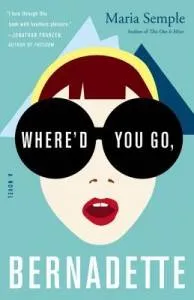 Where’d You Go, Bernadette? by Maria Semple
An epistolary novel about agoraphobia, depression, and the Arctic doesn’t sound like it would be a lot of fun. And yet this novel is. It’s the funny, very modern story of Bernadette, a genius architect whose abrasive personality and professional disaster have made her retreat from the world. Her nemesis is another Seattle mom, her husband is a Microsoft guru, and her daughter is the driving force behind the plot. Semple treats all of these sympathetically, even if it takes a while.
—Christine Ro
Where’d You Go, Bernadette? by Maria Semple
An epistolary novel about agoraphobia, depression, and the Arctic doesn’t sound like it would be a lot of fun. And yet this novel is. It’s the funny, very modern story of Bernadette, a genius architect whose abrasive personality and professional disaster have made her retreat from the world. Her nemesis is another Seattle mom, her husband is a Microsoft guru, and her daughter is the driving force behind the plot. Semple treats all of these sympathetically, even if it takes a while.
—Christine Ro
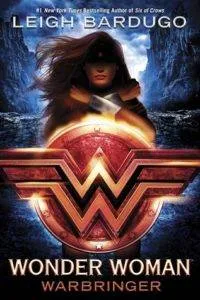 Wonder Woman: Warbringer by Leigh Bardugo
I love Leigh Bardugo and I am newly obsessed with Wonder Woman, so of course I was going to pick up Wonder Woman: Warbringer, a YA taking on Diana’s origin story and her first experience leaving Themyscira to visit the human world. The impetus for her flight from the island is a young woman, Alia Keralis, who isn’t just an ordinary girl. Alia is a Warbringer, “a direct descendant of the infamous Helen of Troy, fated to bring about an age of bloodshed and misery.” Diana and Alia vow to work together to help end her family’s curse, a decision that could have grave consequences for them both. This book is a wonderful adventure story, and the cast of characters that Bardugo surrounds Diana and Alia with are full of life and spunk. I couldn’t put this one down.
—Kim Ukura
Wonder Woman: Warbringer by Leigh Bardugo
I love Leigh Bardugo and I am newly obsessed with Wonder Woman, so of course I was going to pick up Wonder Woman: Warbringer, a YA taking on Diana’s origin story and her first experience leaving Themyscira to visit the human world. The impetus for her flight from the island is a young woman, Alia Keralis, who isn’t just an ordinary girl. Alia is a Warbringer, “a direct descendant of the infamous Helen of Troy, fated to bring about an age of bloodshed and misery.” Diana and Alia vow to work together to help end her family’s curse, a decision that could have grave consequences for them both. This book is a wonderful adventure story, and the cast of characters that Bardugo surrounds Diana and Alia with are full of life and spunk. I couldn’t put this one down.
—Kim Ukura
